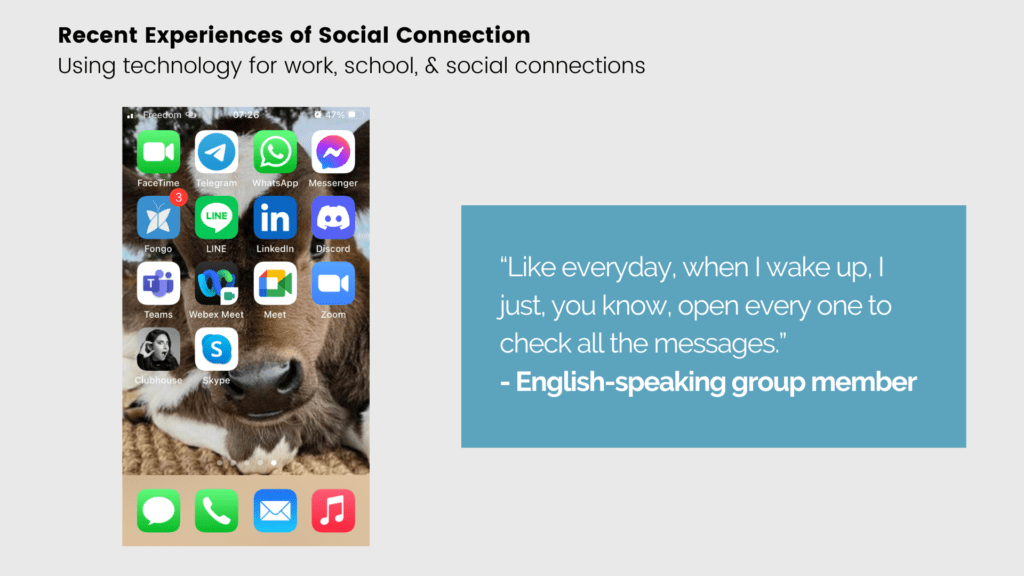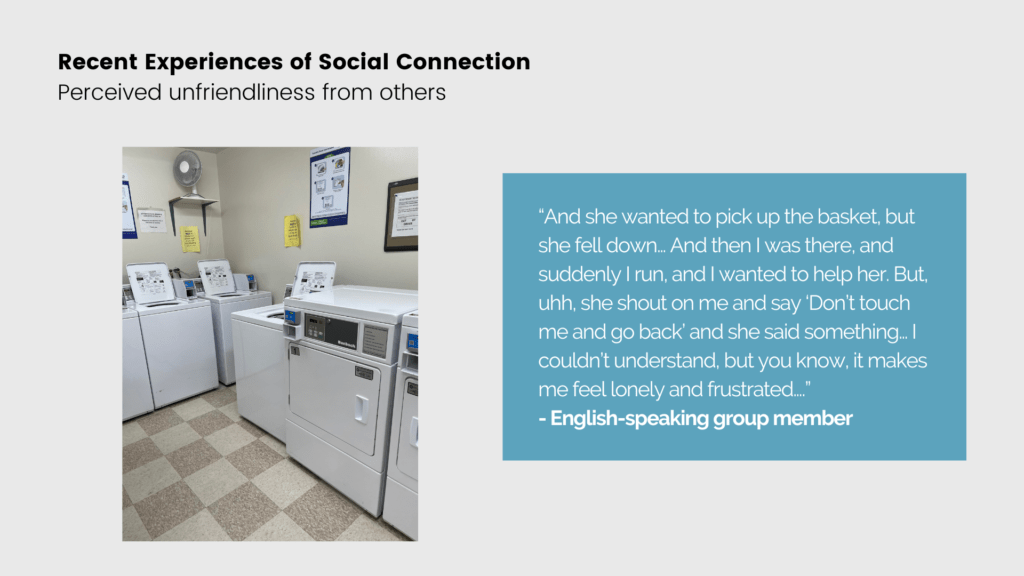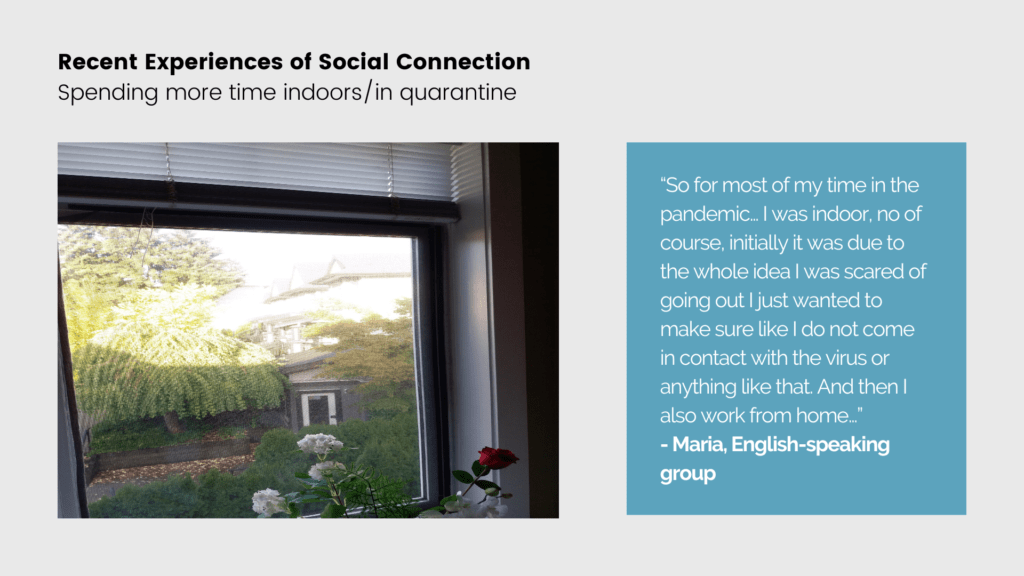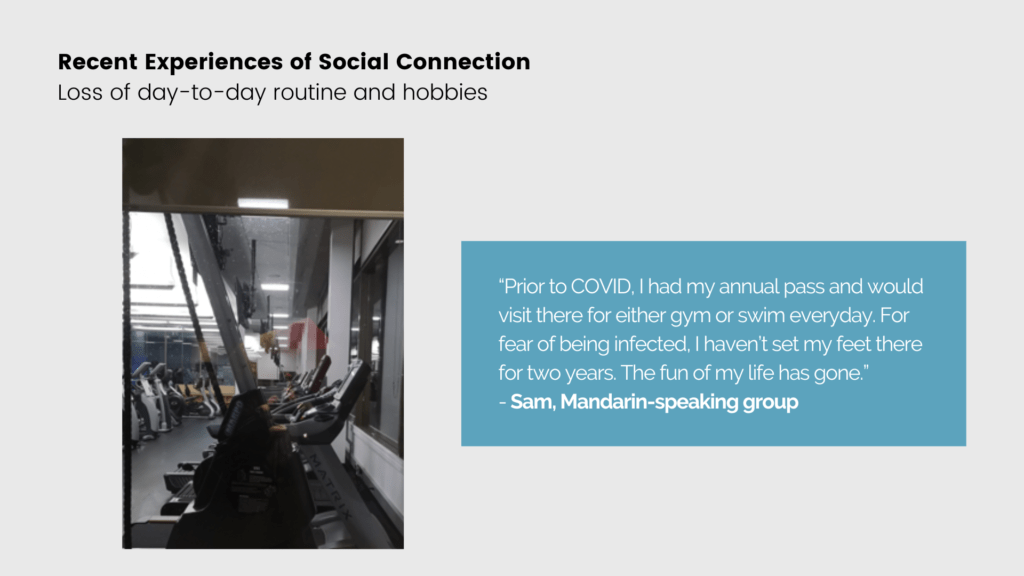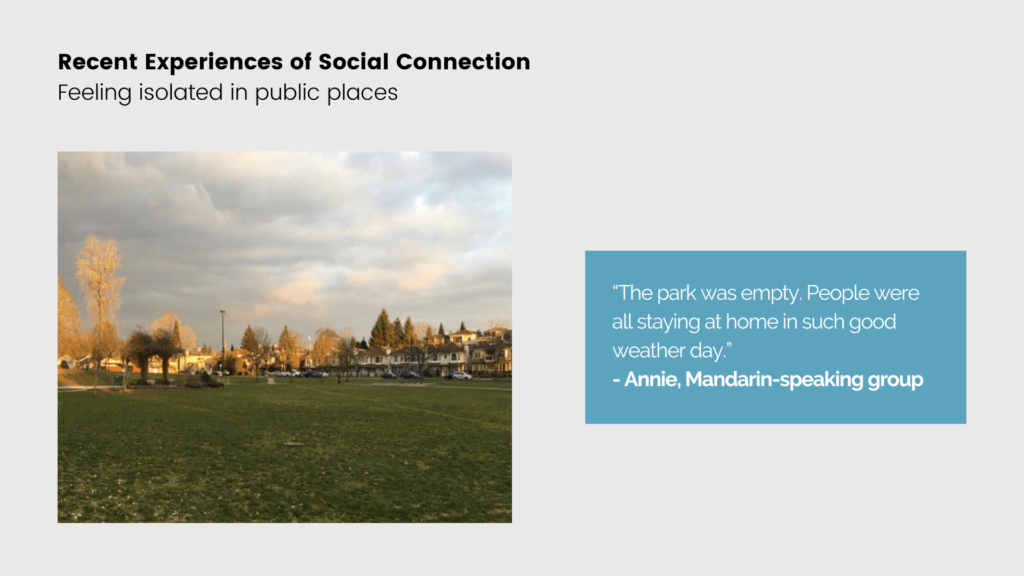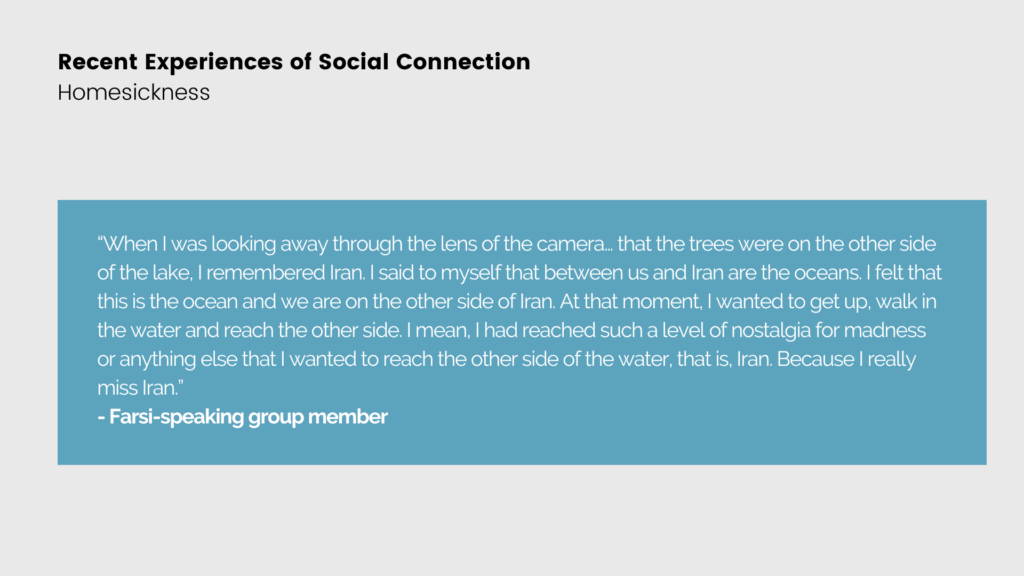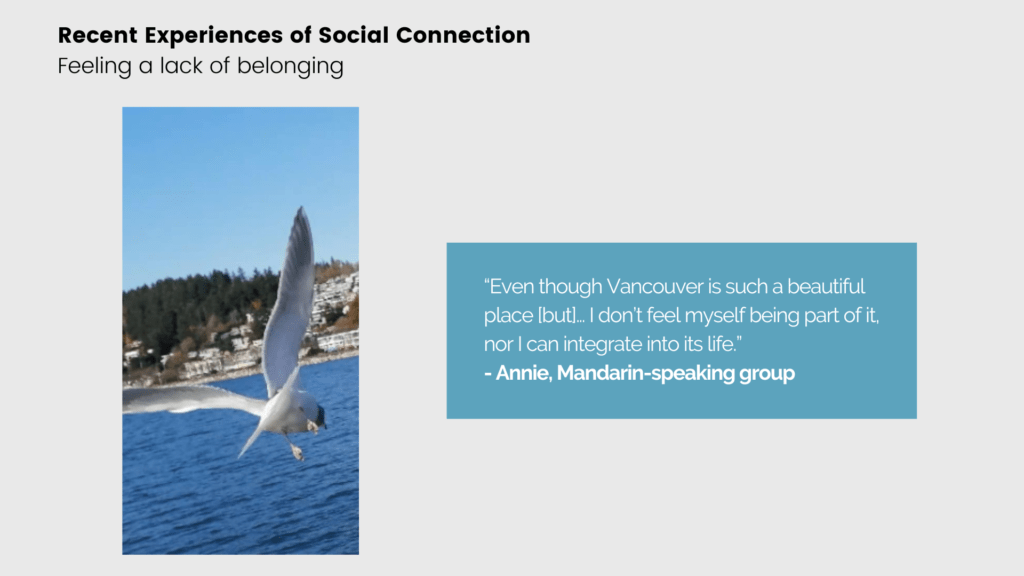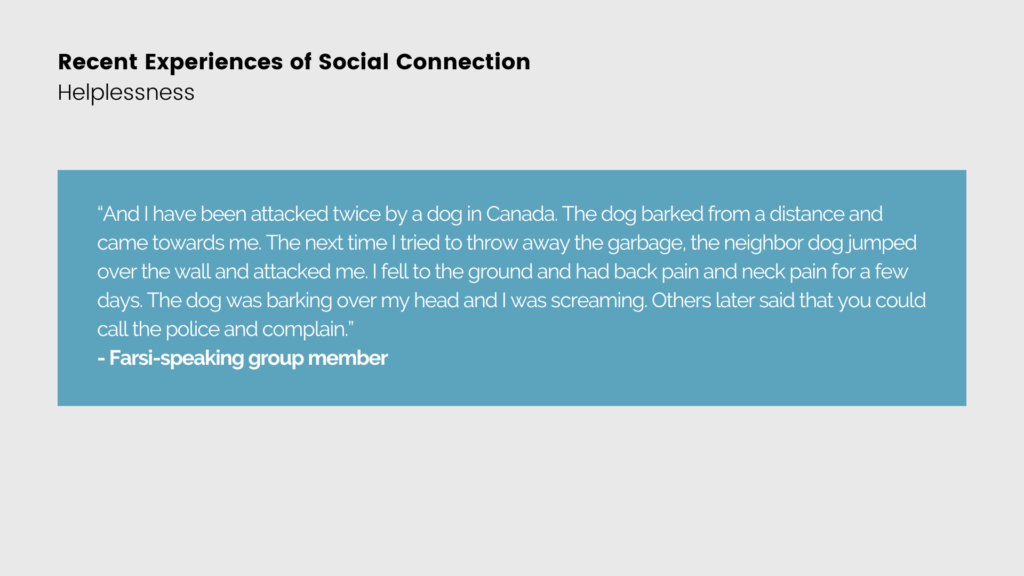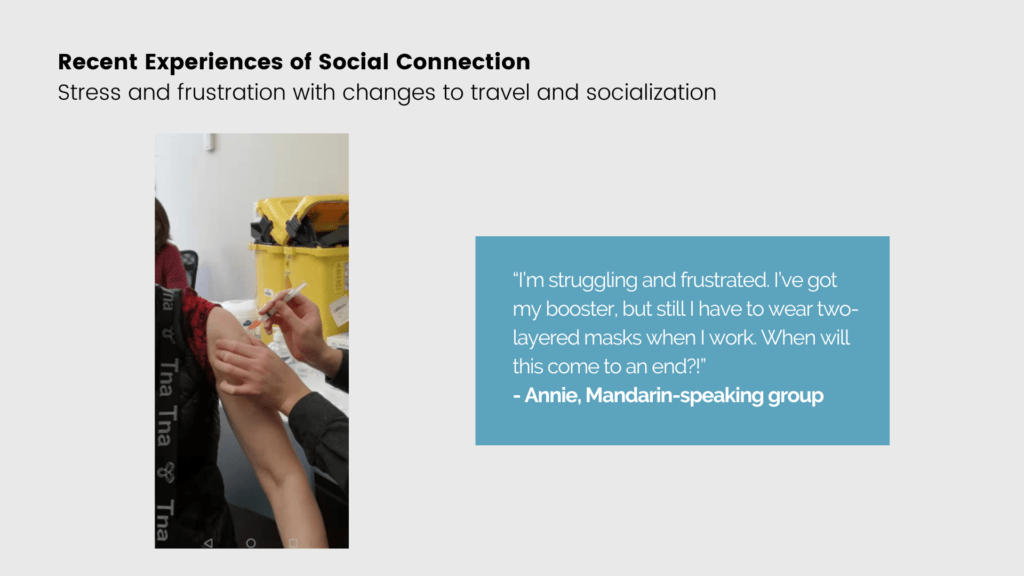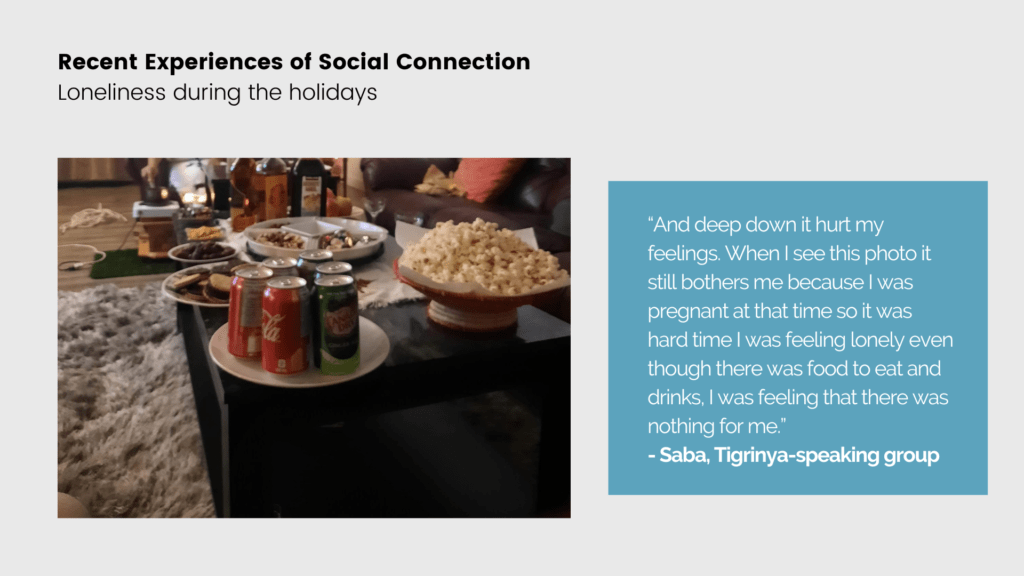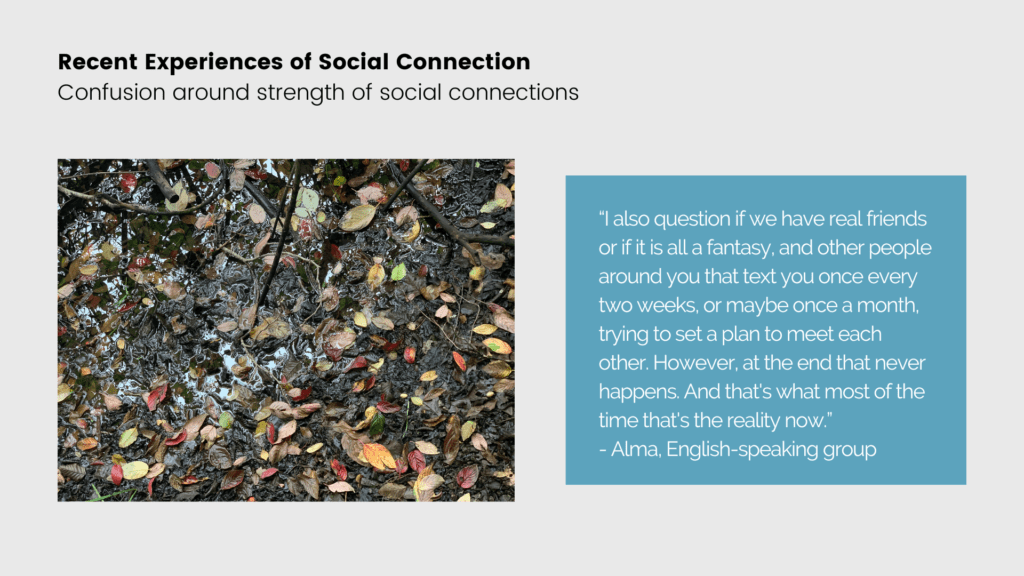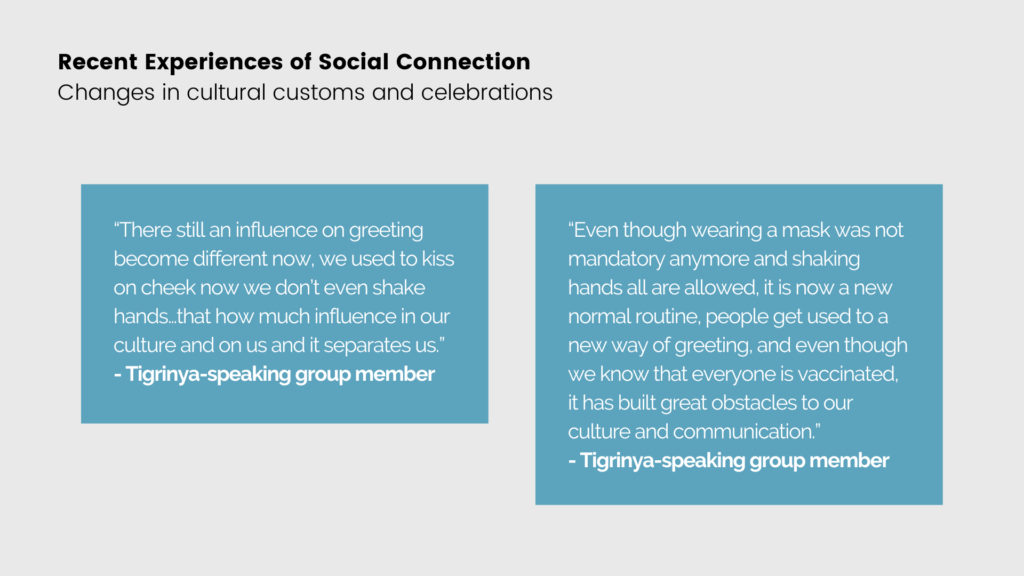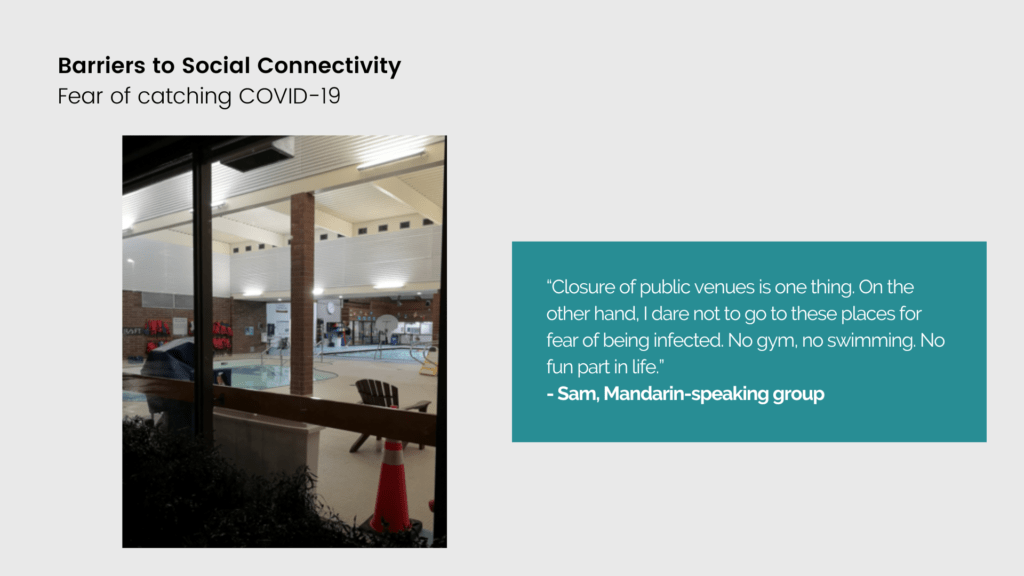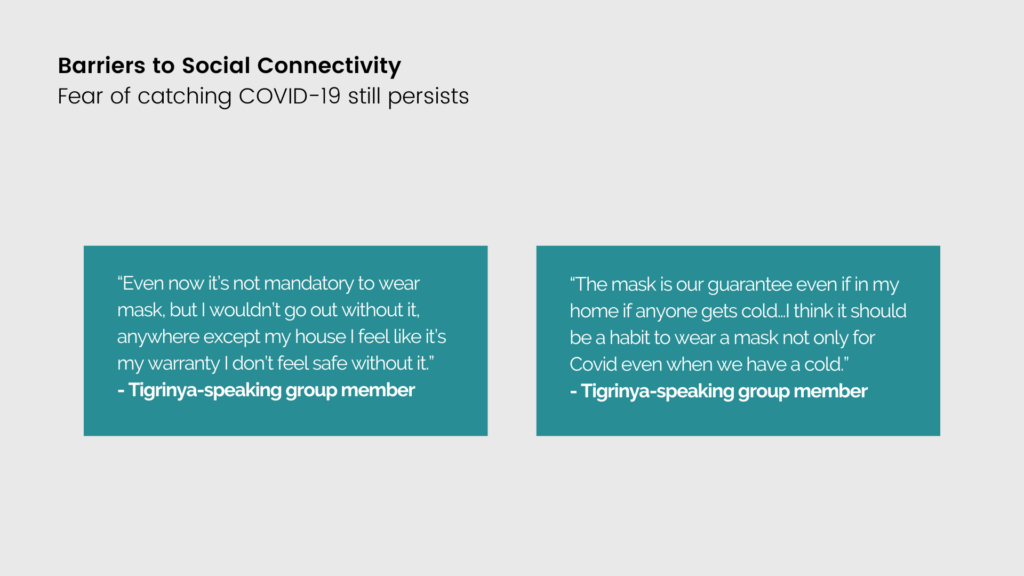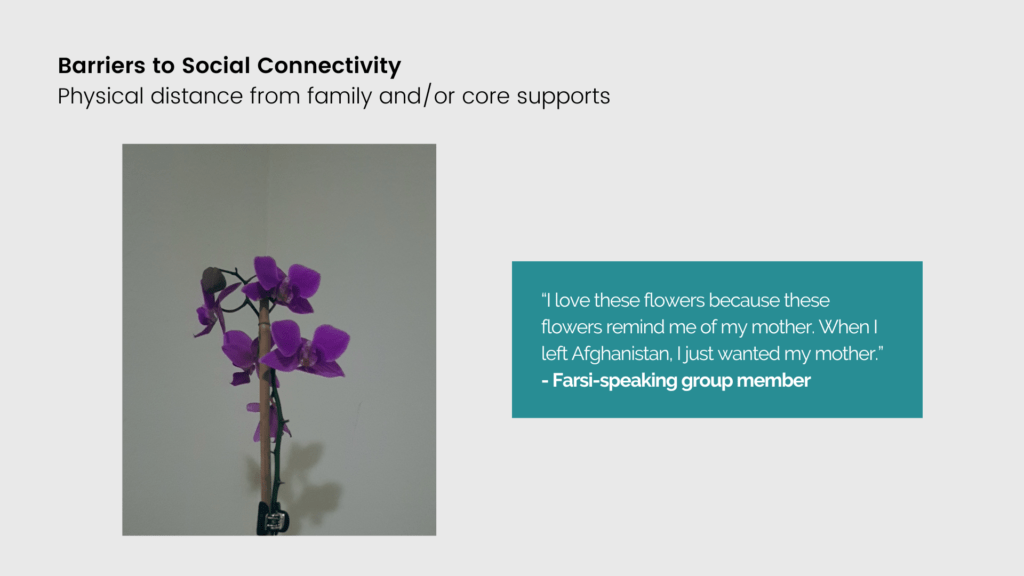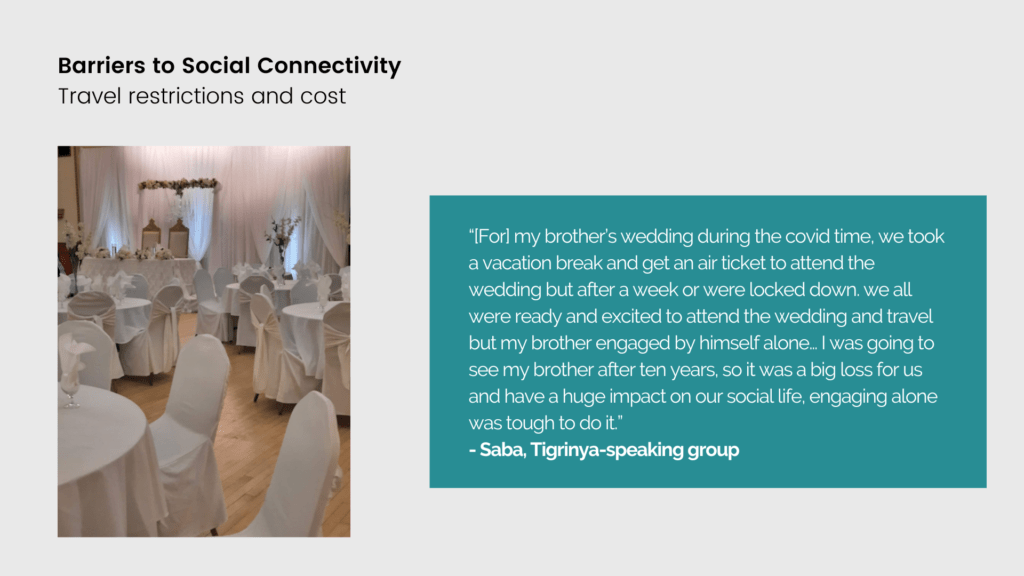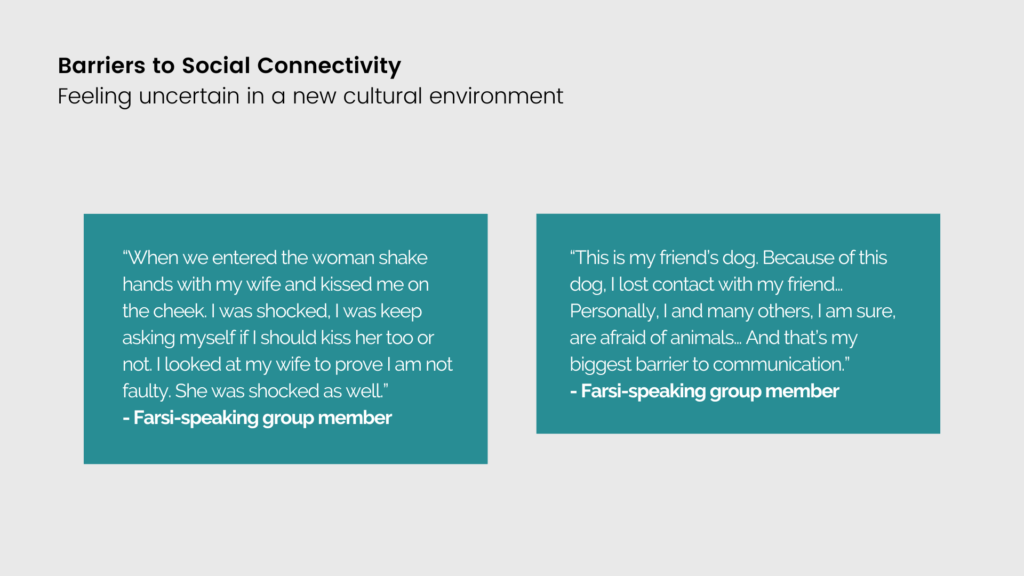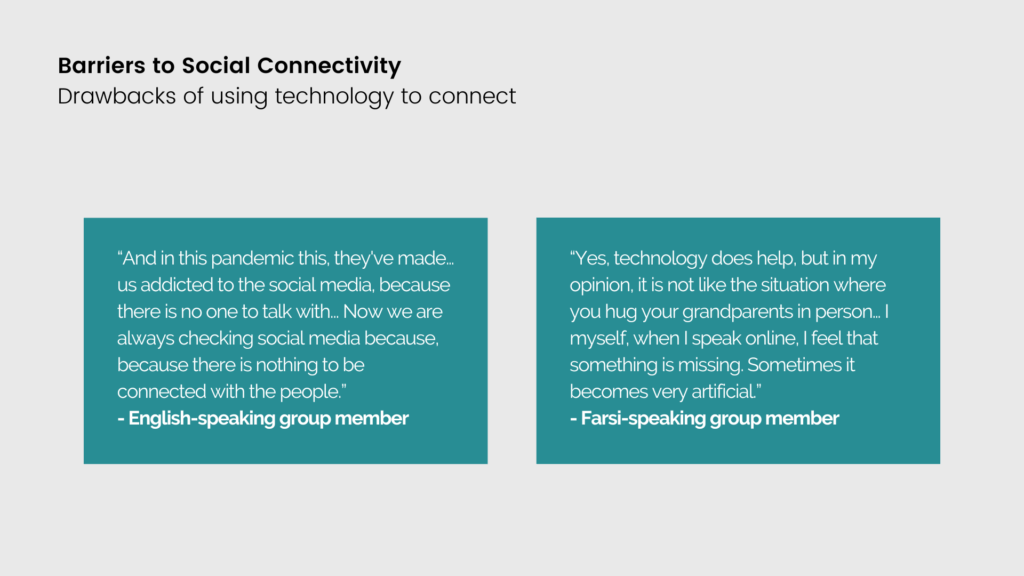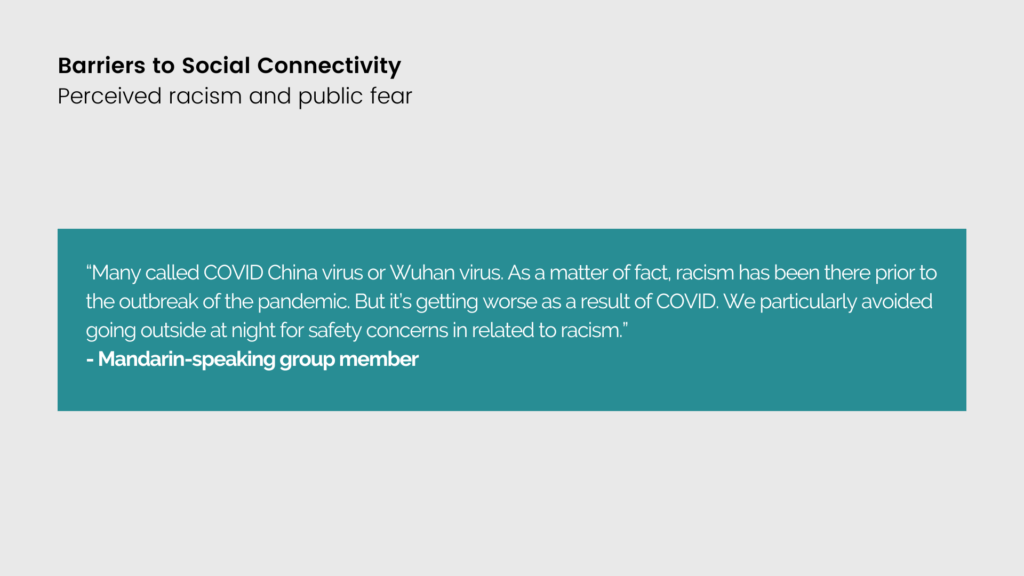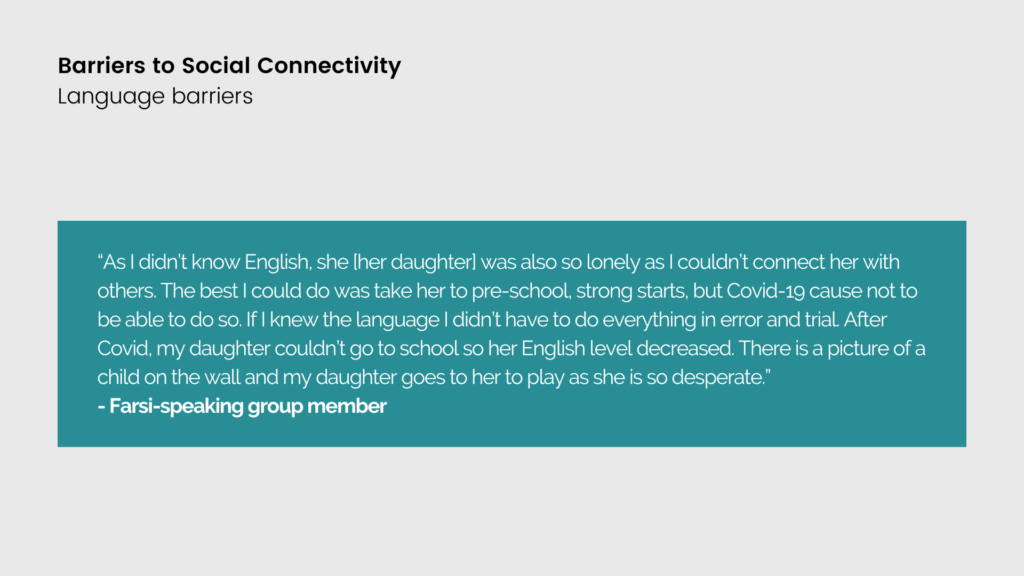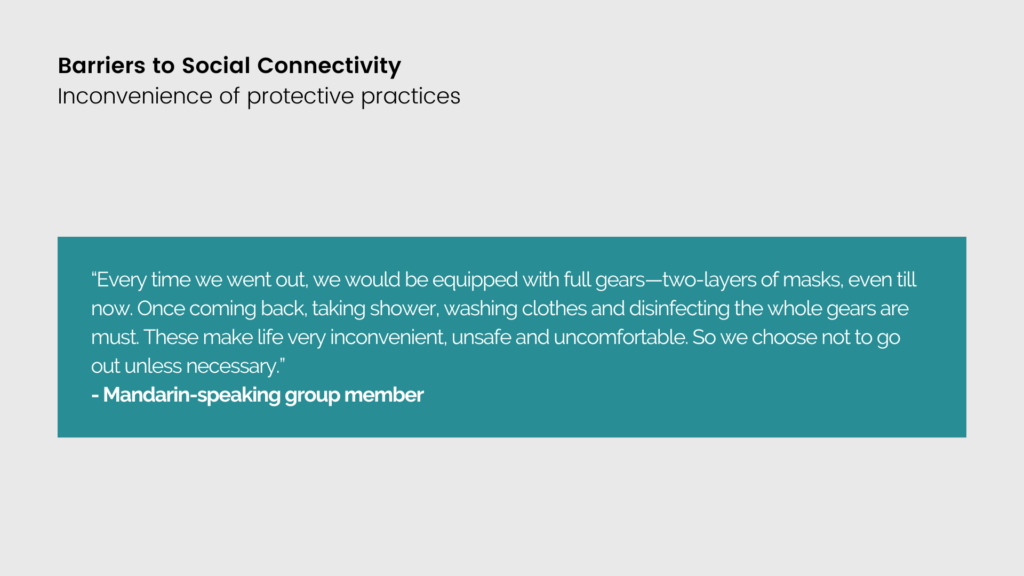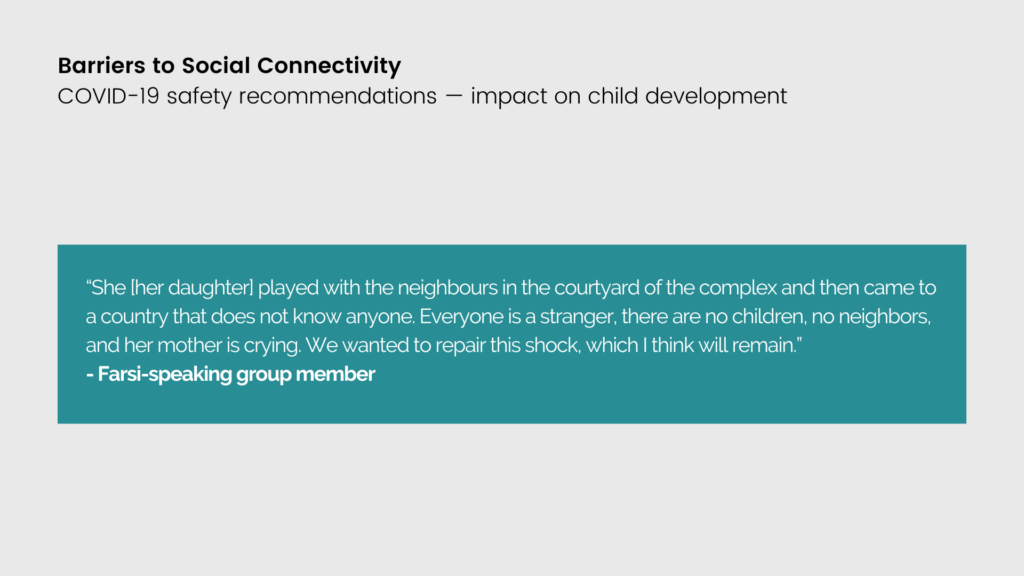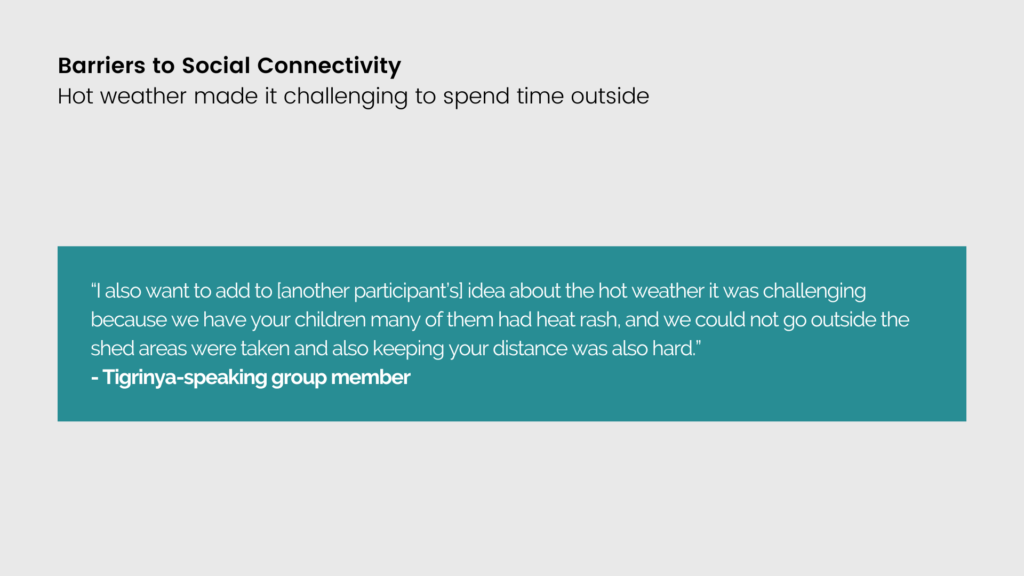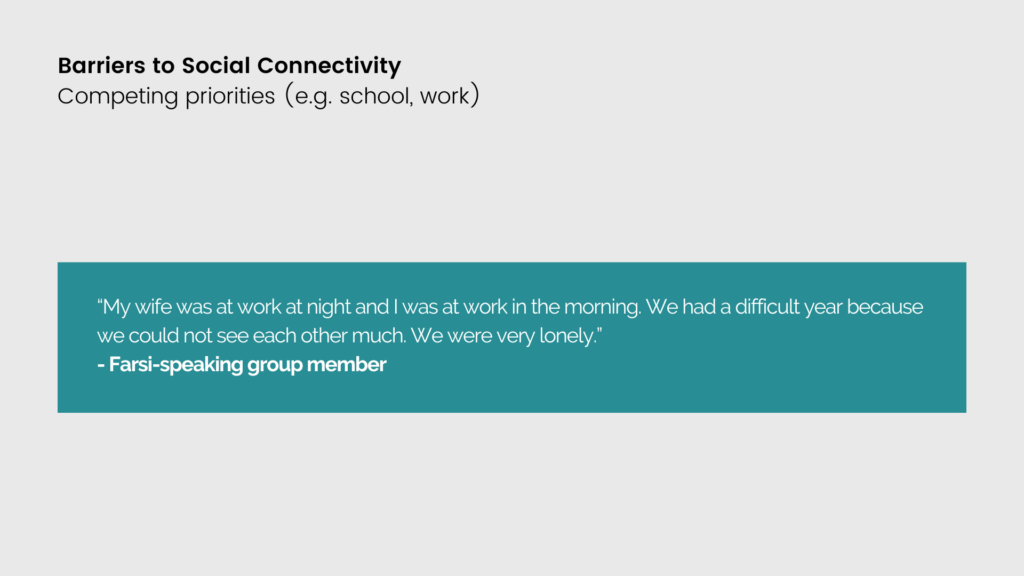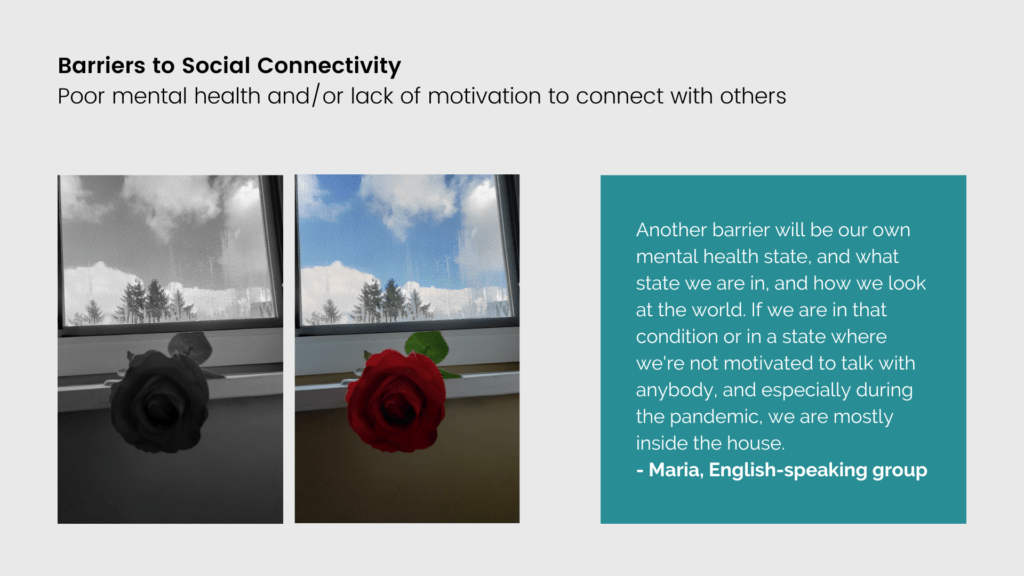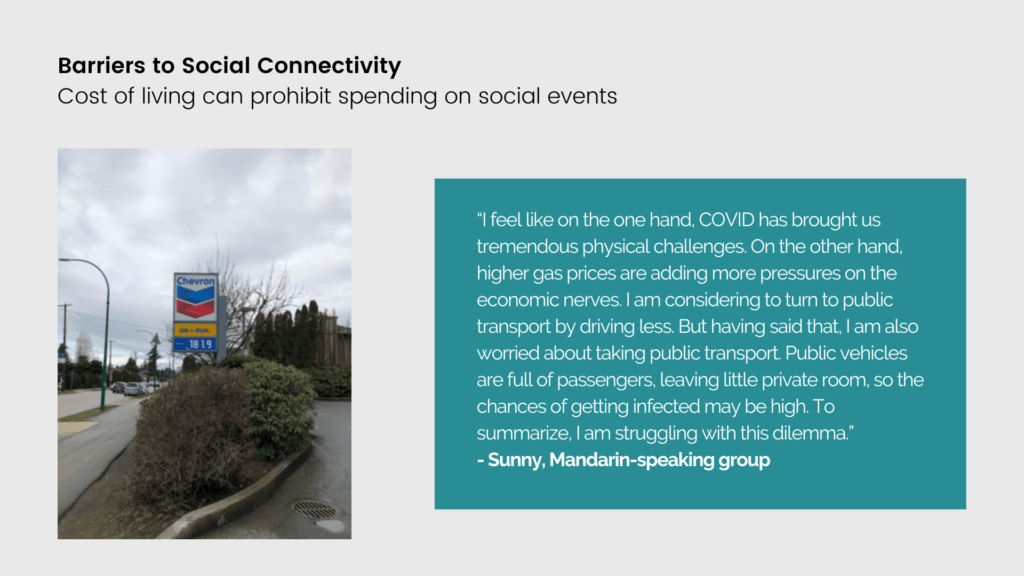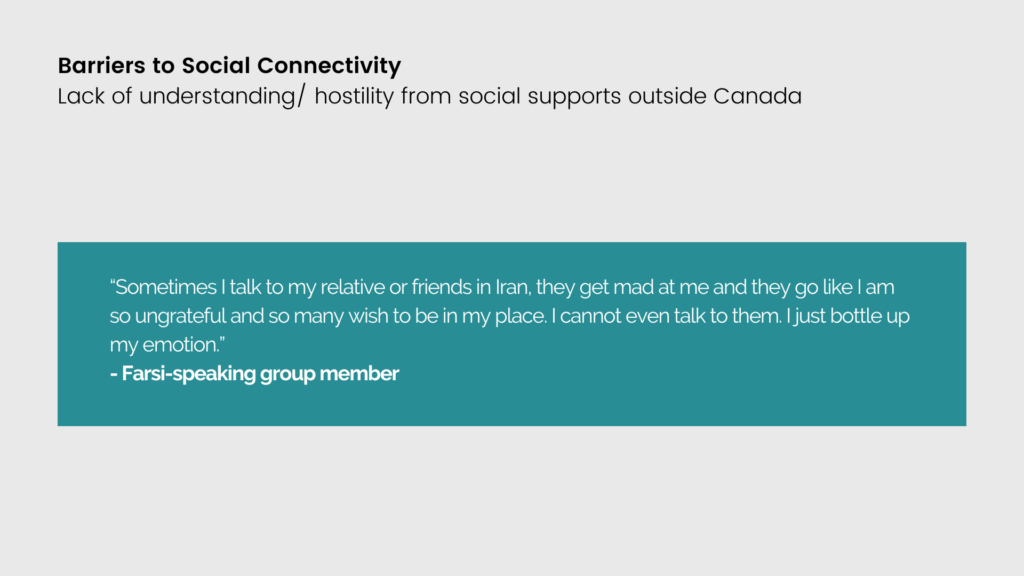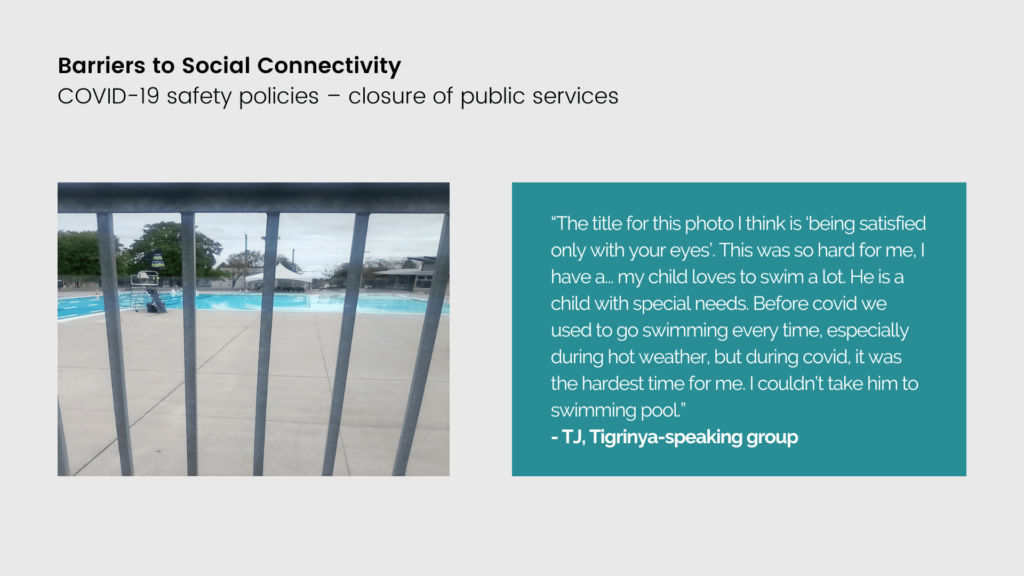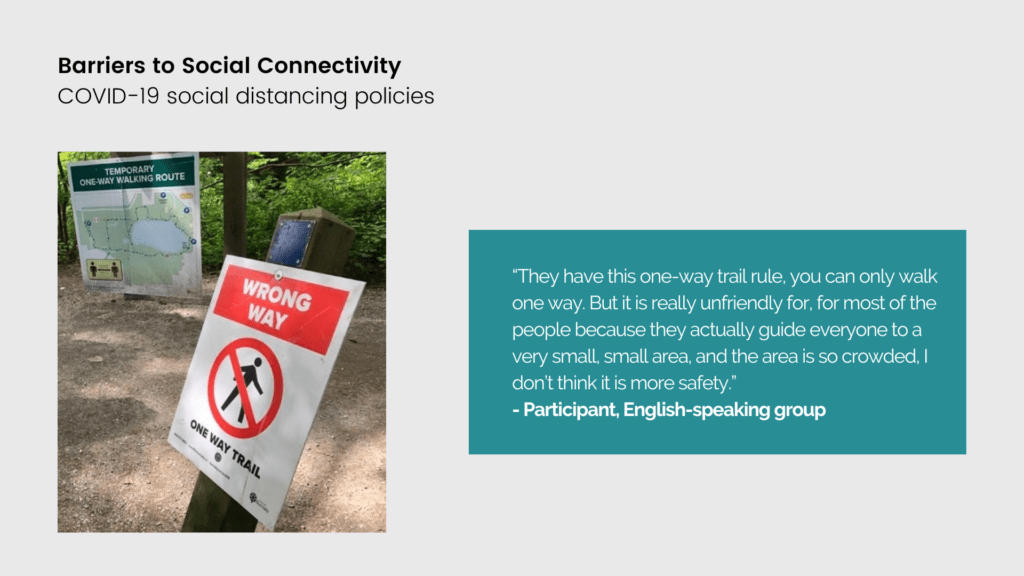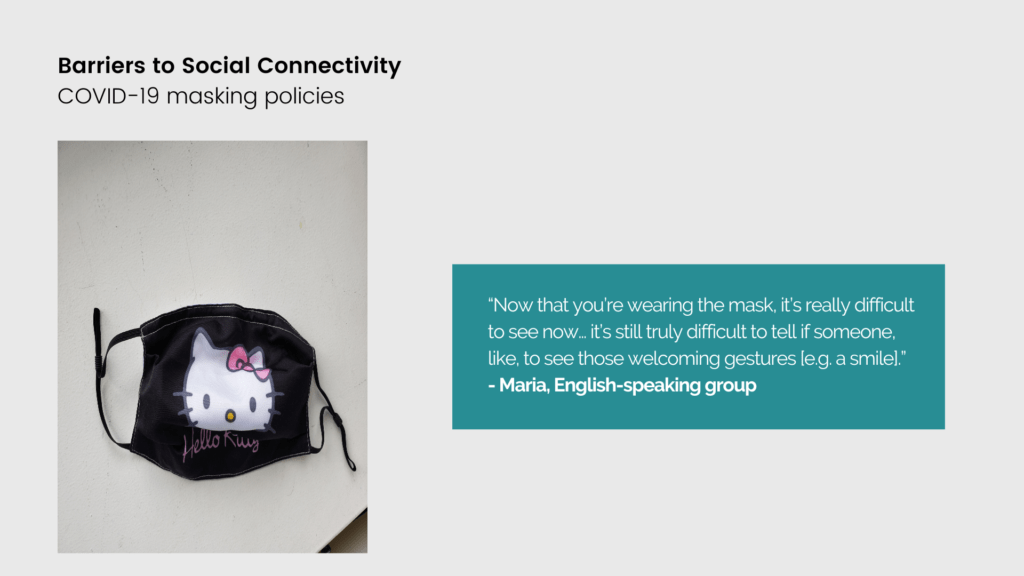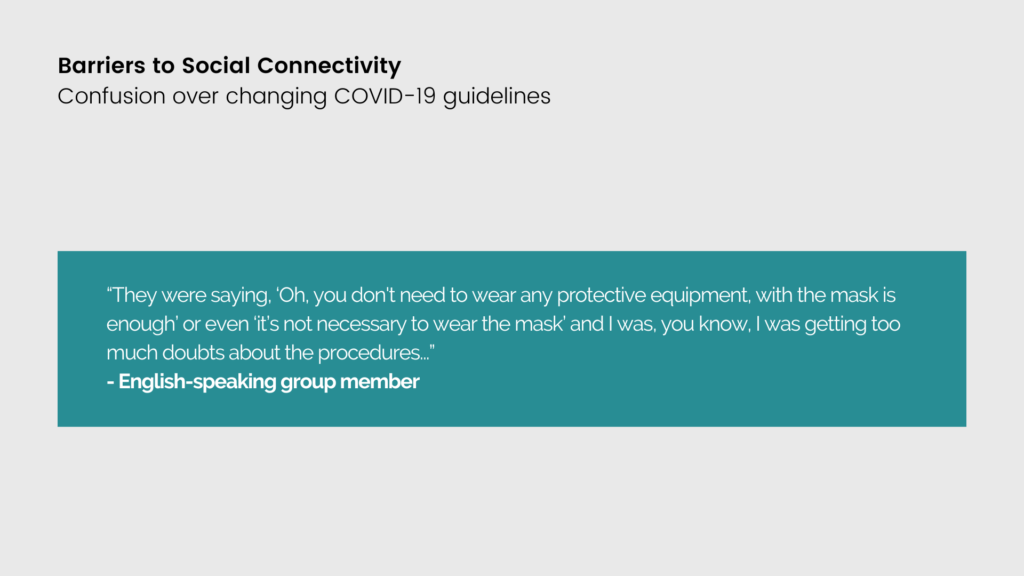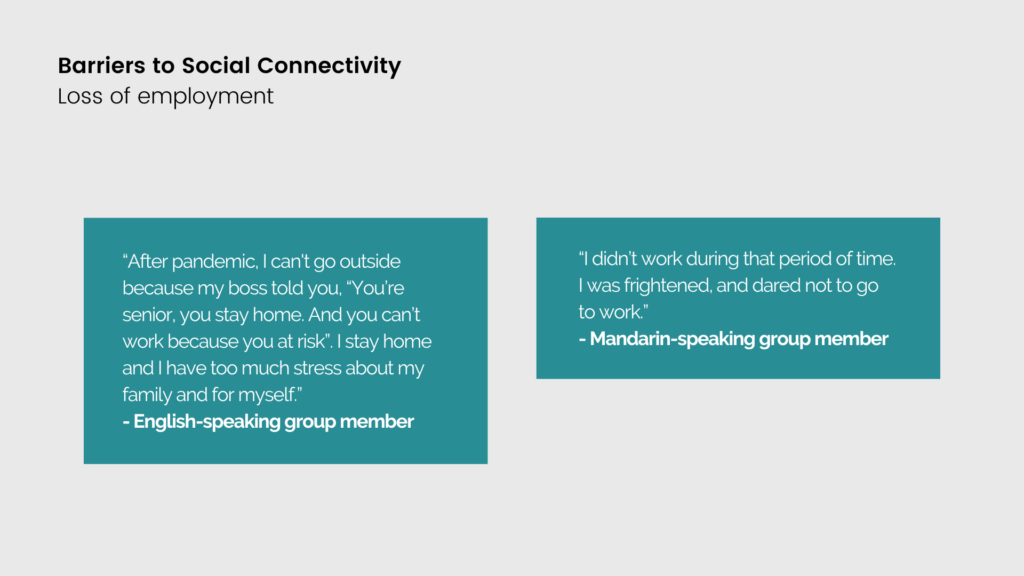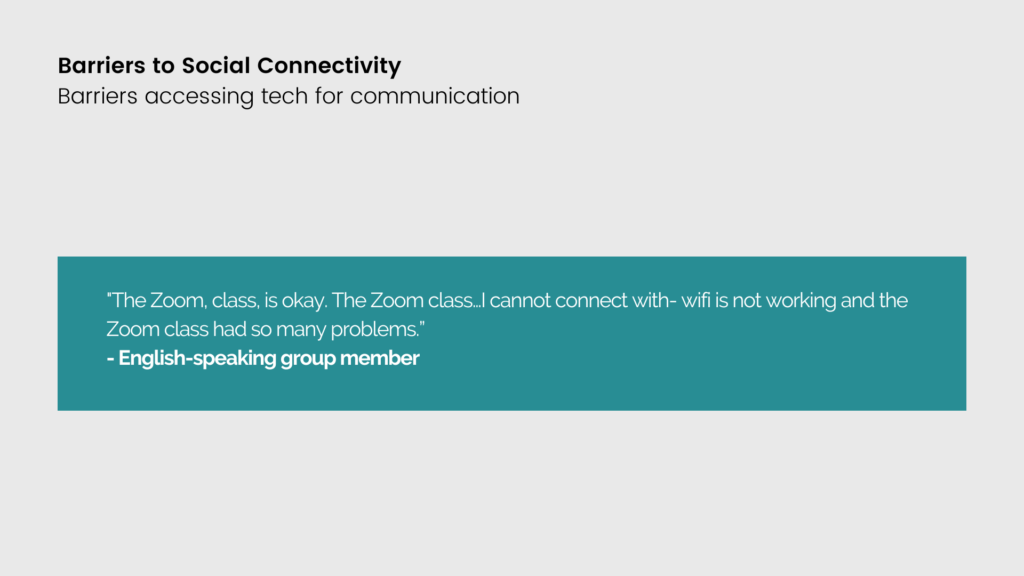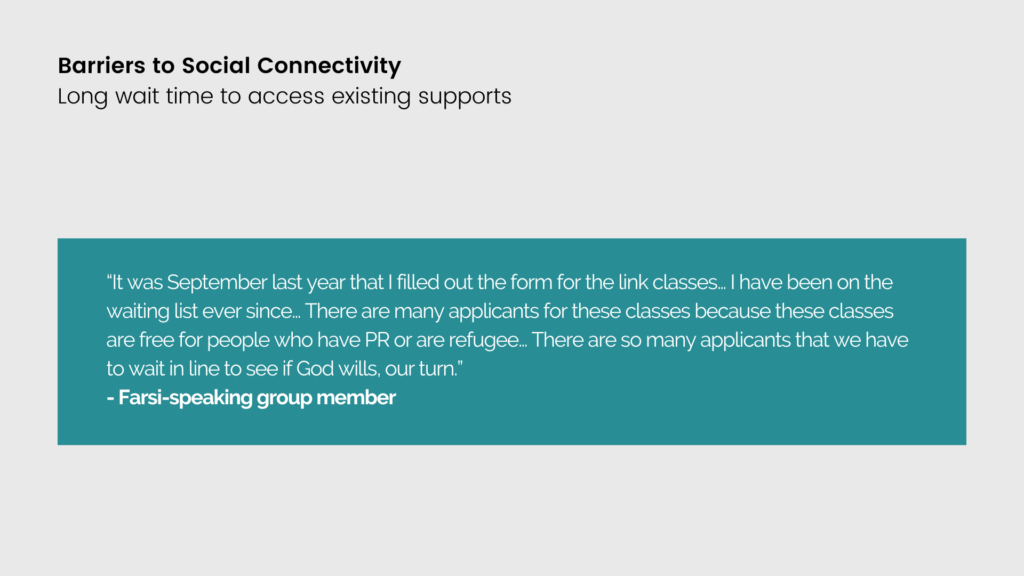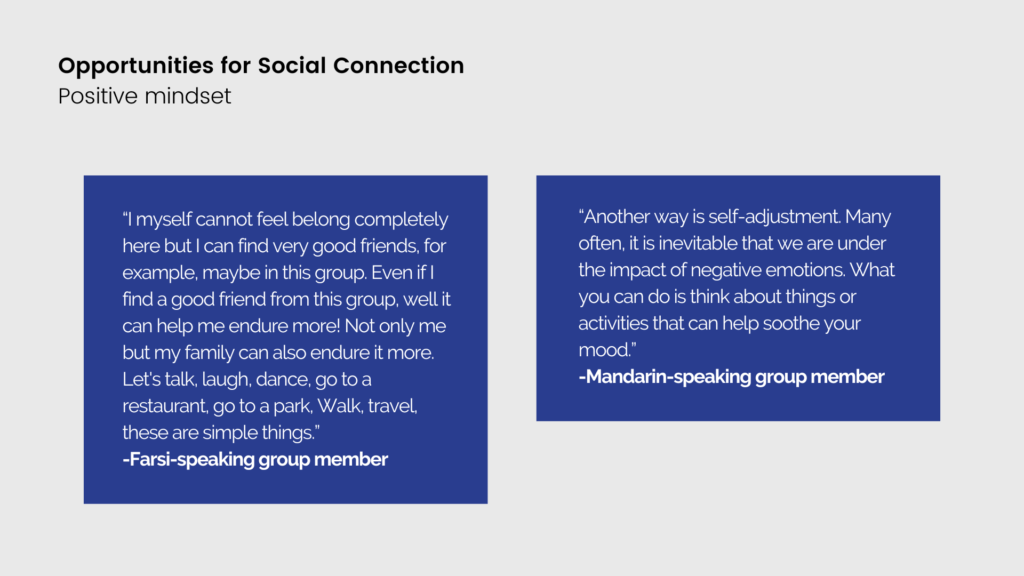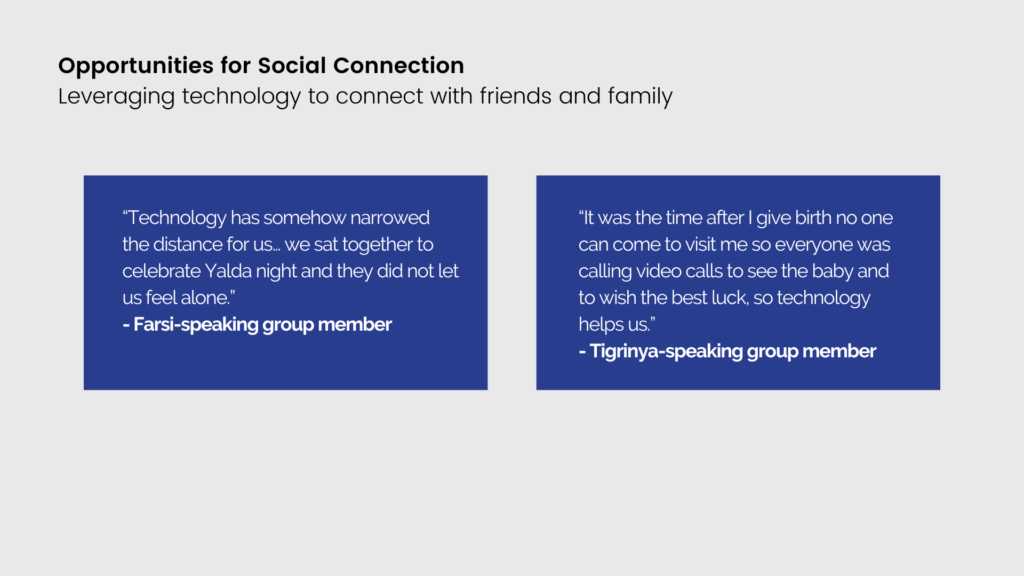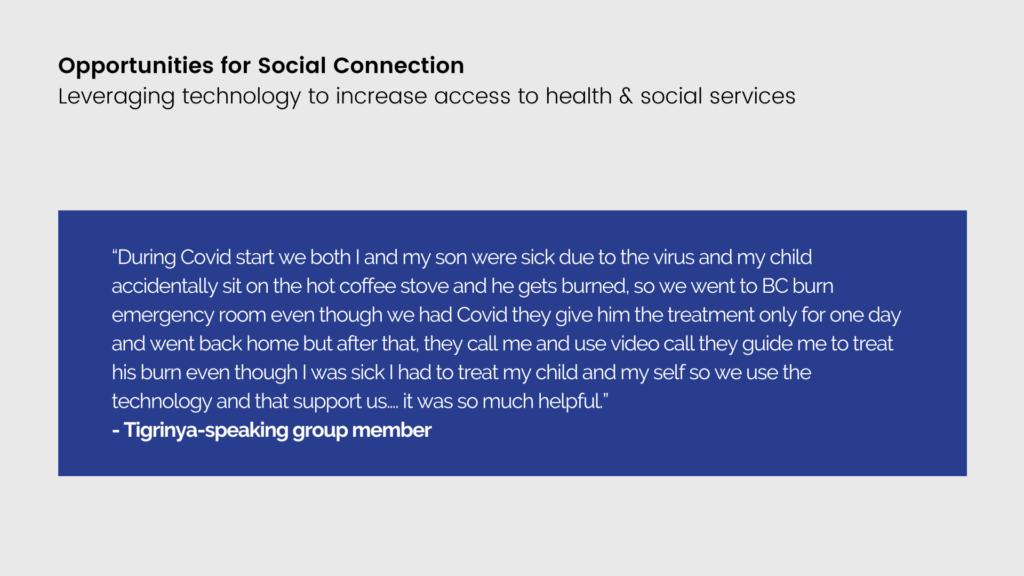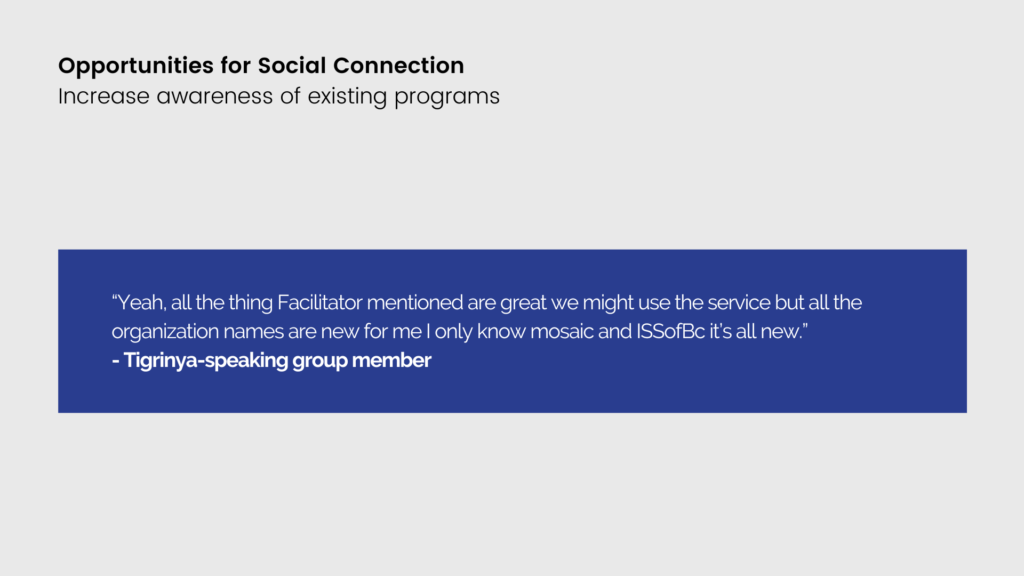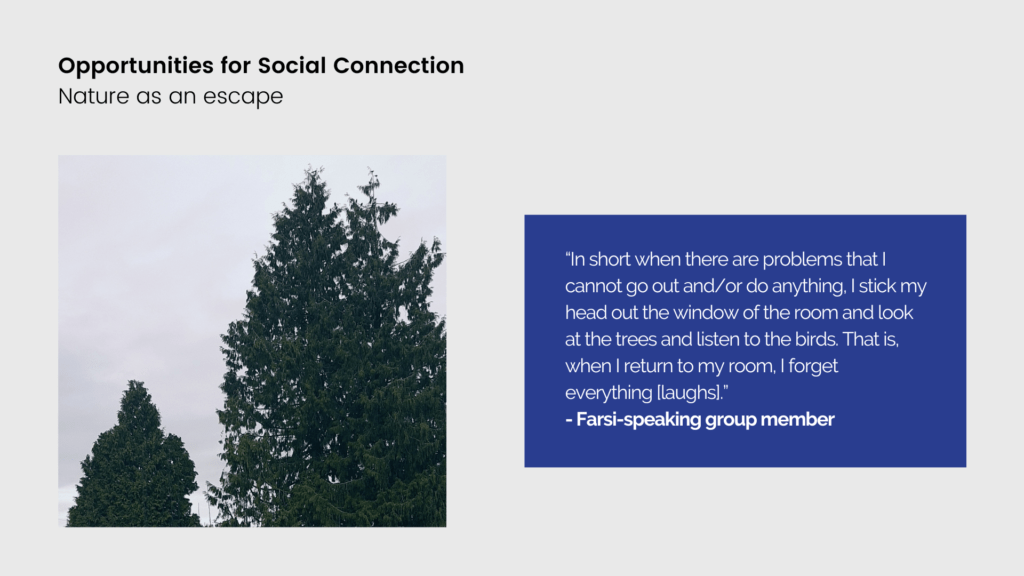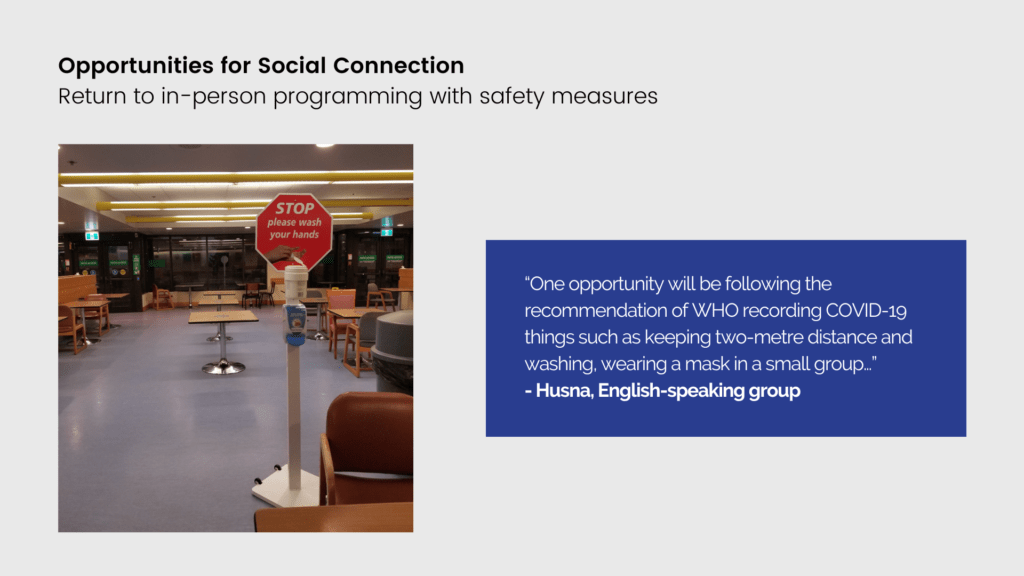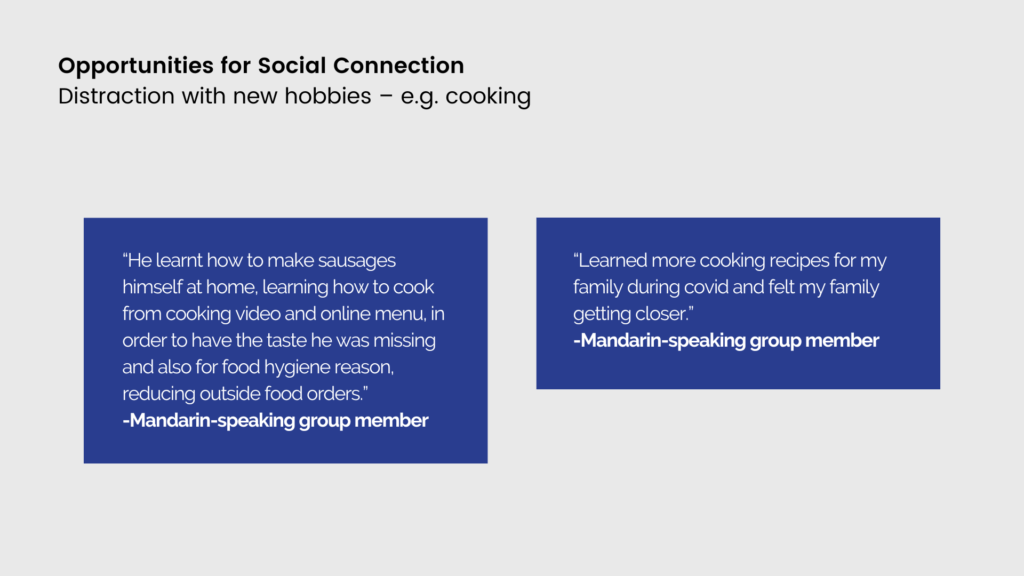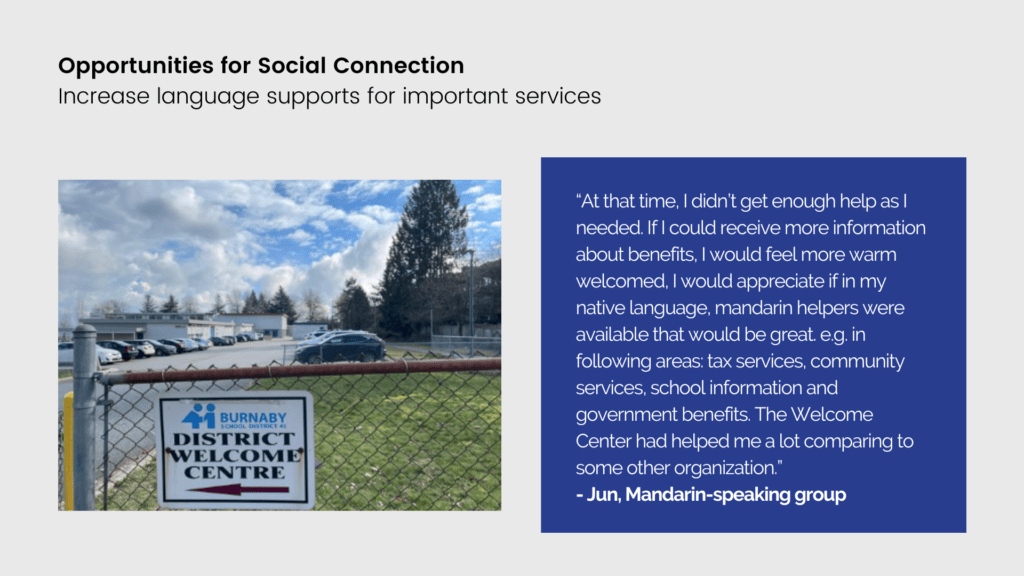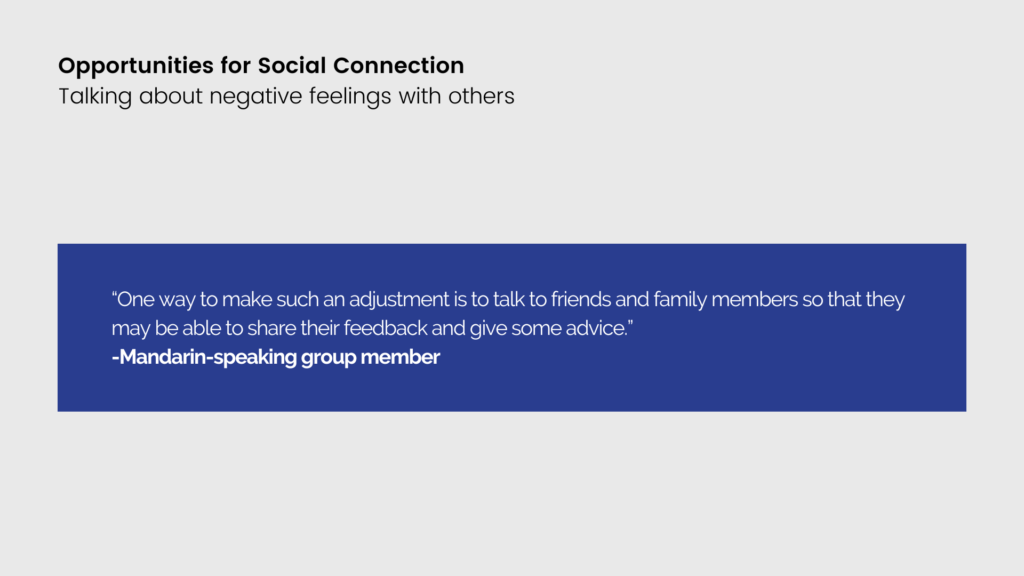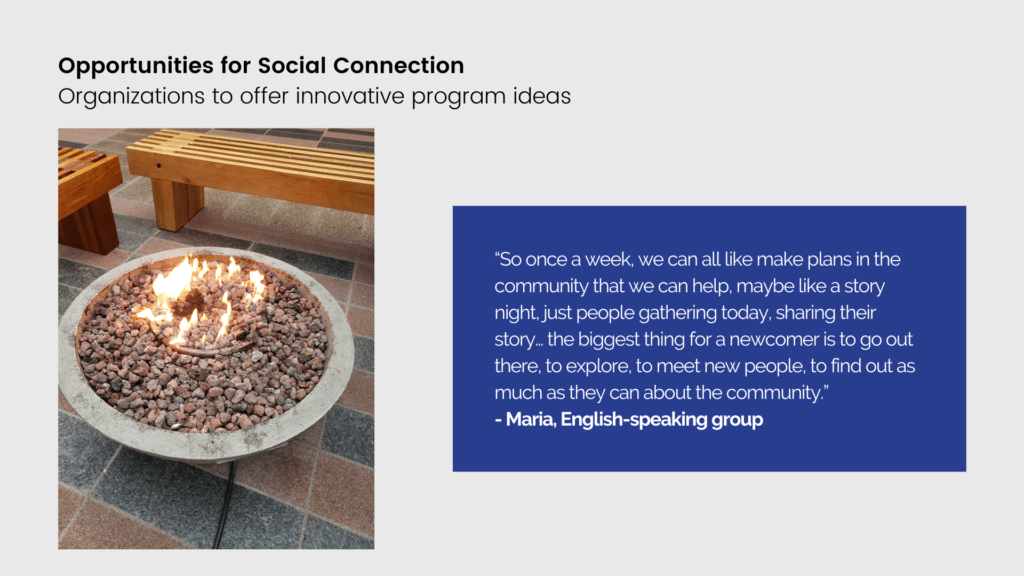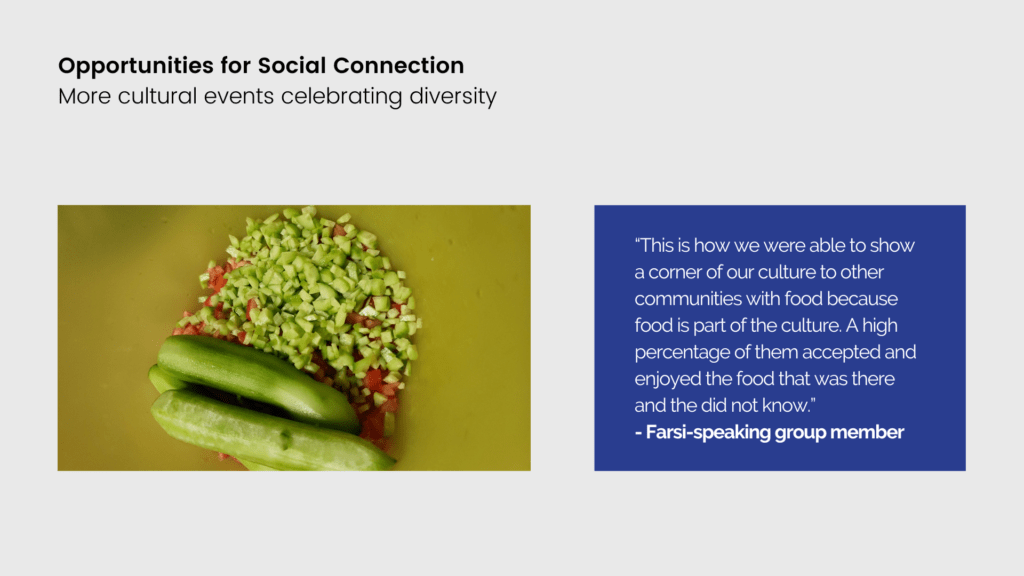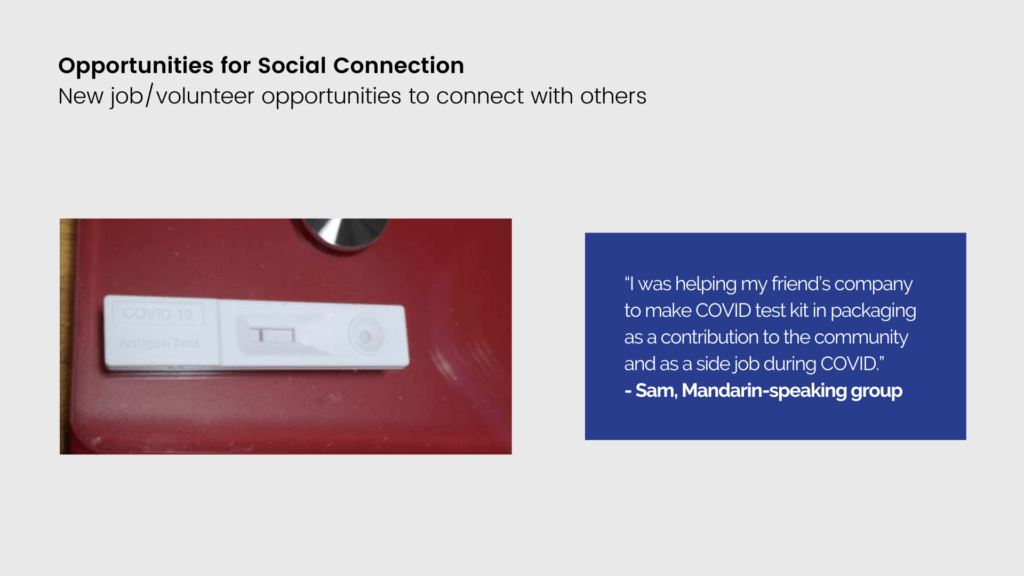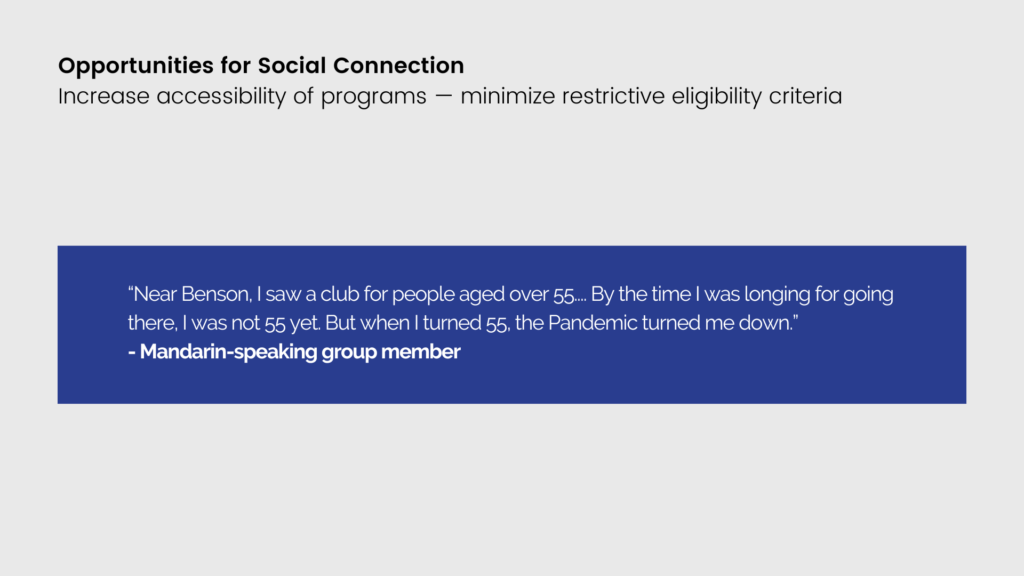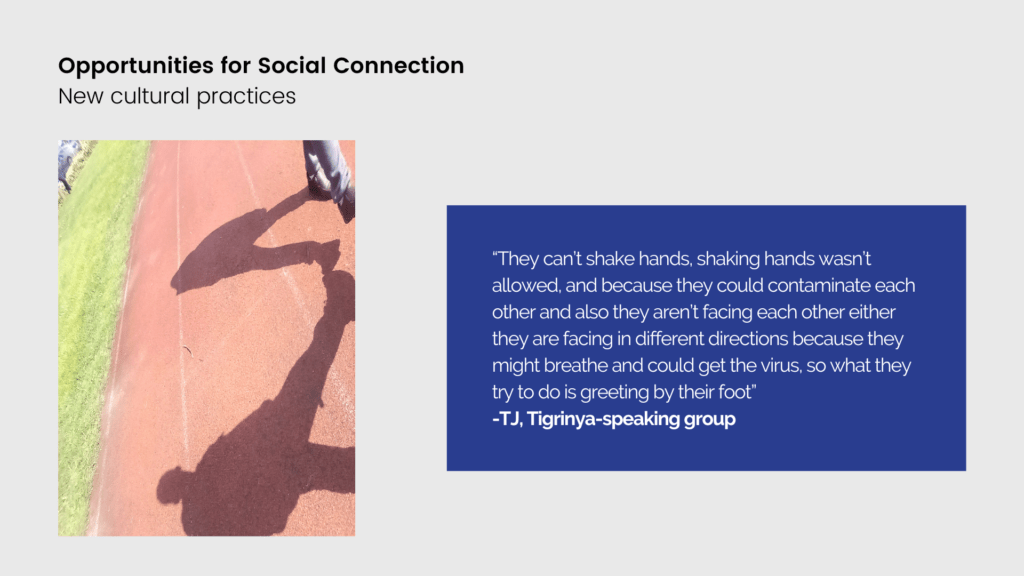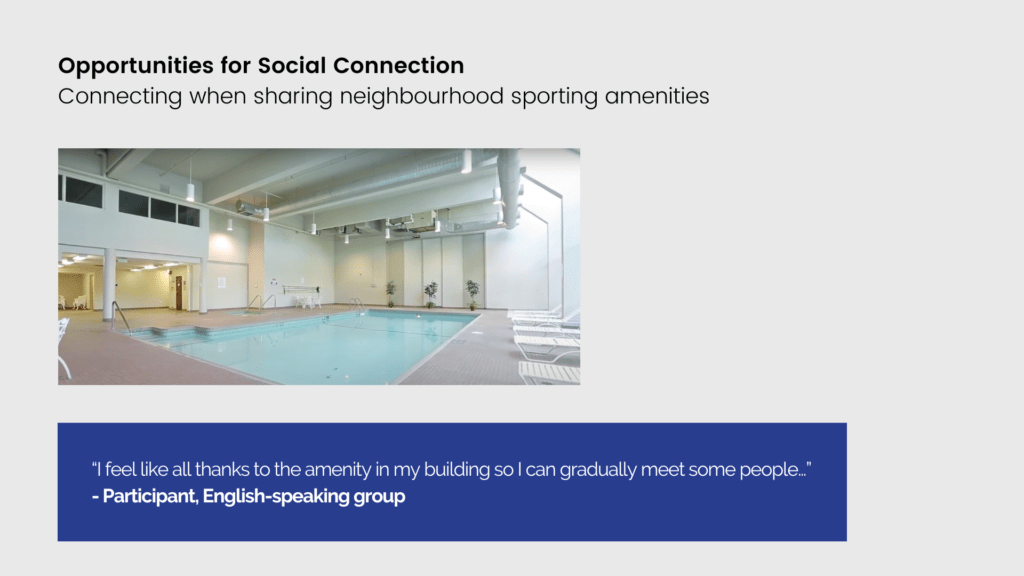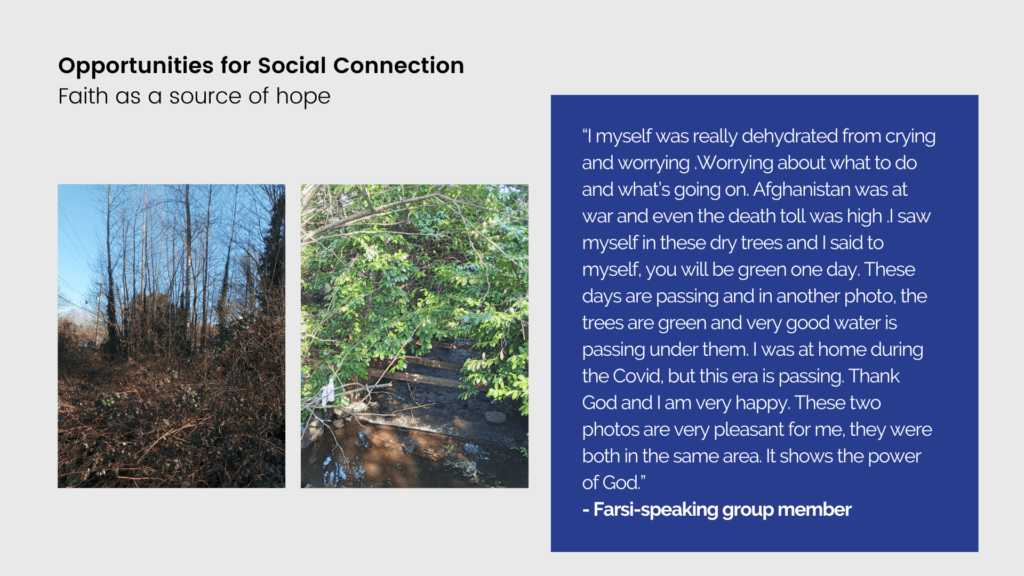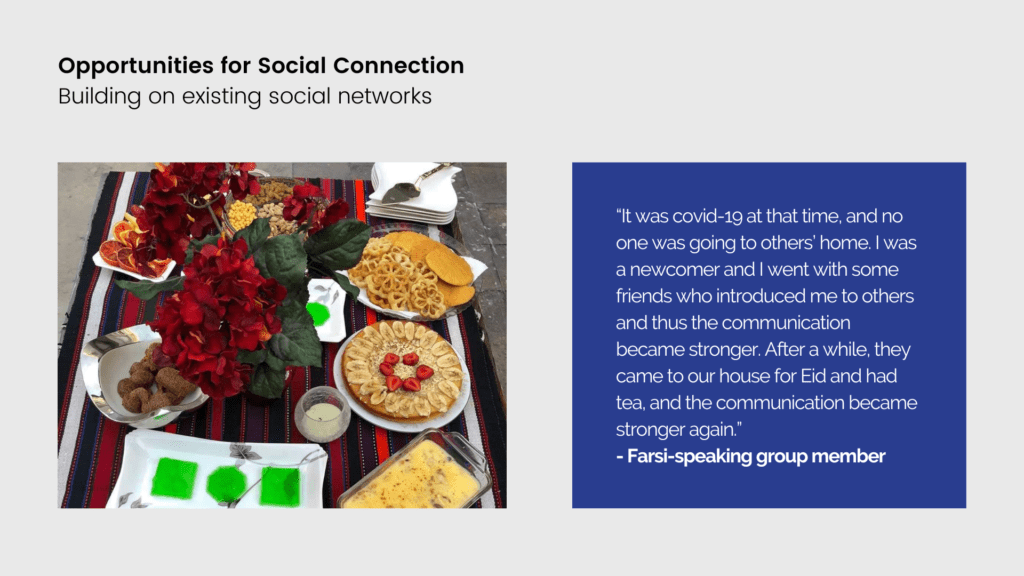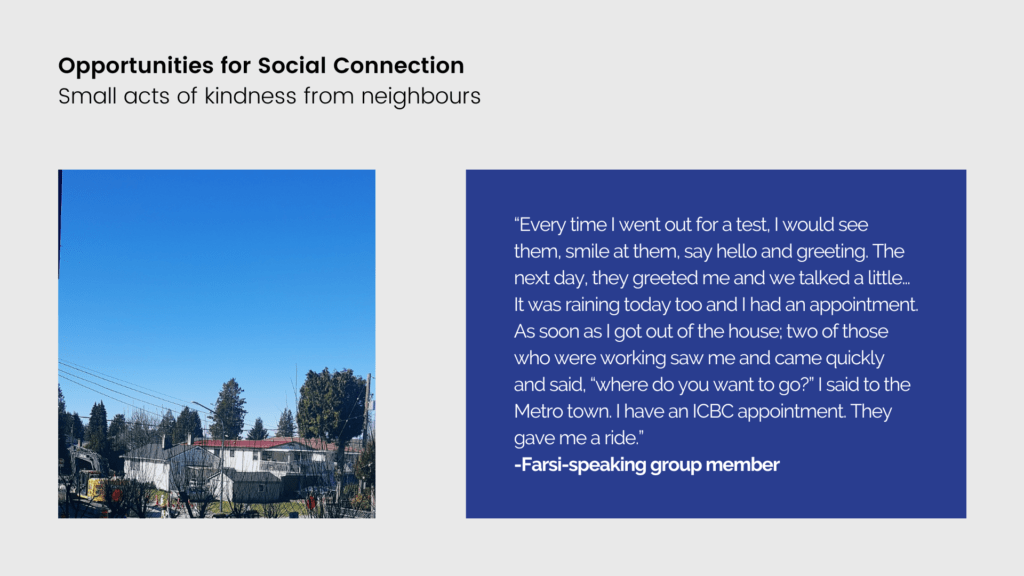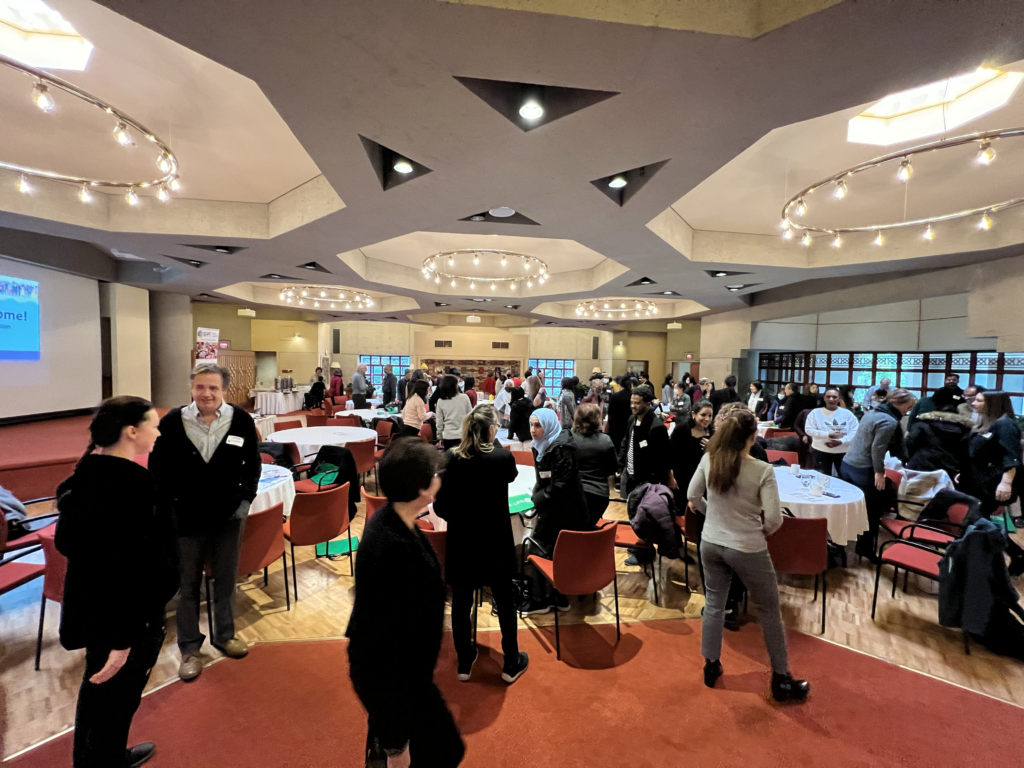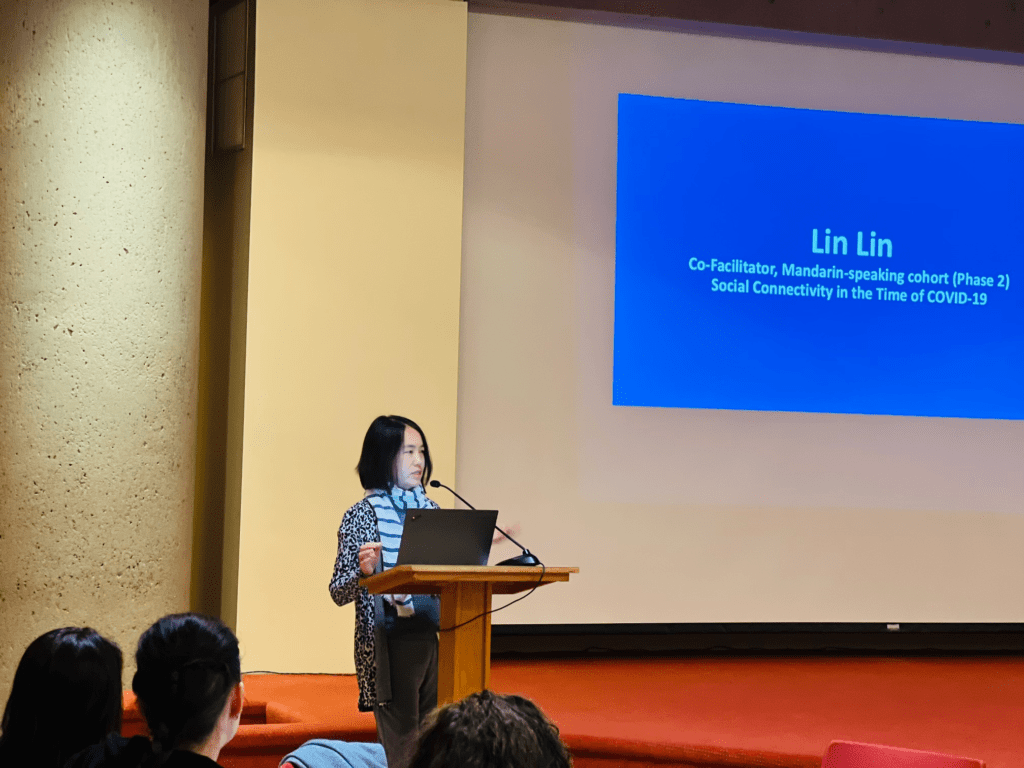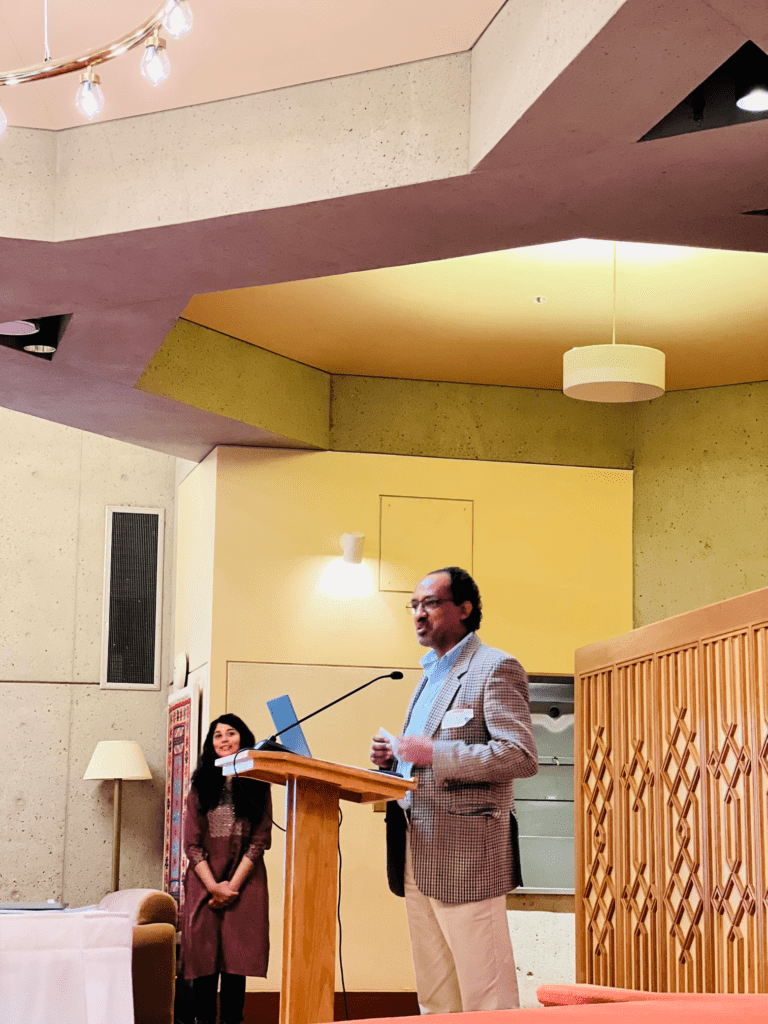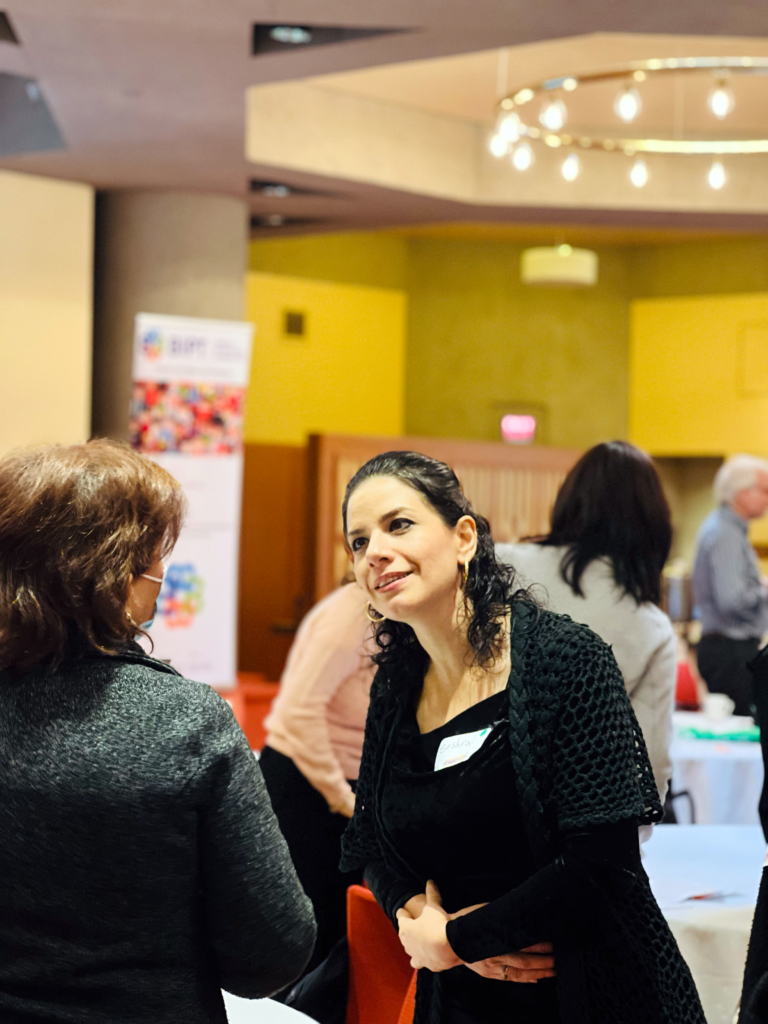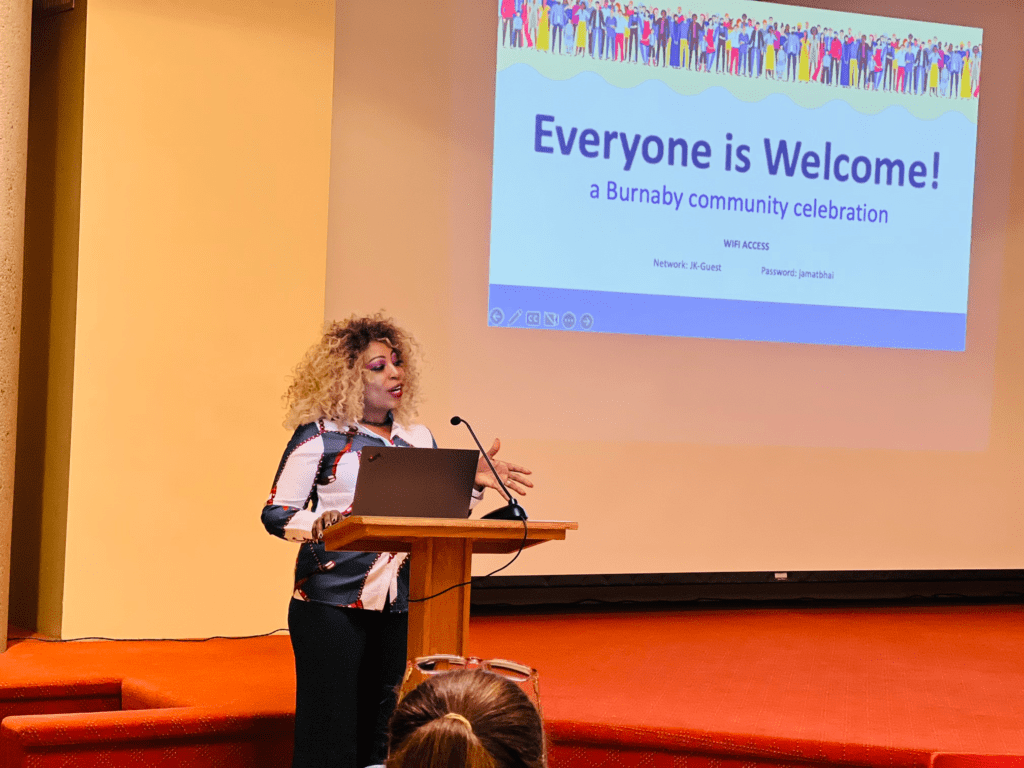
Social Connectivity
in Burnaby
本那比的新移民利用攝影作為研究工具,引發小組討論,探討 COVID-19 如何影響社會聯繫,以及社區組織可以發揮的作用,幫助我們感受到更多的聯繫。
本那比 PCN 社會孤立工作小組 (SIWG) 正在進行以社區為基礎的研究,調查如何在 COVID-19 大流行期間及之後增加本那比的社會連接性,以指導本那比的心理健康策略。
The research is split into two phases with Phase 1 (Fall 2021) conducted in English and Phase 2 (Spring 2022) conducted in Tigrinya, Farsi, and Chinese to reach some of Burnaby’s most isolated individuals. The group sessions involved community members self-identifying as isolated recent newcomers of racialized communities, who shared their experiences of social isolation using Photovoice research methodology (a mix of photography and discussions).
研究結果為 SIWG 提供了洞察力,讓他們了解本拿比社區組織如何解決連接障礙,以及如何利用社區成員討論的機會,構思創新且可持續的解決方案。
*For the best experience, consider viewing this page on a desktop device.
BACKGROUND
Social isolation can be described as the “disengagement from social ties, institutional connections, or community participation” (BCCDC, 2019) and is a known social determinant of health for many health conditions, including anxiety, depression, addiction, cardiovascular disease, diabetes and premature mortality.
Social isolation is linked to, but is different, from loneliness; social isolation is the objective separation from other people; whereas loneliness is the subjective distressed feeling of being alone as defined by the National Institute of Ageing.
Social connectivity is the opposite of social isolation; it is a sense of belonging to a group or community and is associated with having personal relationships and engagement with the broader community.
COVID-19 related restrictions have made social isolation worse for most, however, racialized newcomer communities may be made more vulnerable. Yet with all this knowledge, there is limited data on how community agencies can promote social connectivity!
Below are photos describing some of the recent experiences of social connectivity and social isolation that were experienced by participants.
Recent Experiences of Social Connection
| Recent Experience | English Group | Farsi Group | Mandarin Group | 提格里尼亞語 Group |
| Loss of day-to-day routine and hobbies | x | x | x | x |
| Using tech to connect with others | x | x | x | x |
| Quarantine; spending a lot more time indoors | x | x | x | x |
| Feeling unwanted; perceived unfriendliness from others | x | x | x | x |
| Feeling isolated in public spaces | x | x | x | |
| Homesickness | x | x | x | |
| Helplessness | x | x | x | |
| Stress and frustration | x | x | x | |
| Loneliness during the holidays | x | x | ||
| Time spent outdoors in nature as an escape | x | x | ||
| Using tech to work/study online | x | x |
Barriers to Social Connectivity
| Barrier | English Group | Farsi Group | Mandarin Group | 提格里尼亞語 Group |
| Fear of catching COVID-19 | x | x | x | x |
| Distance from family and/or core supports | x | x | x | x |
| Travel restrictions and cost | x | x | x | x |
| Feeling uncertain in a new cultural environment | x | x | x | |
| Perceived racism & public fear | x | x | x | |
| Language barriers | x | x | x | |
| Drawbacks of using tech | x | x | x | |
| Inconvenience of protective practices | x | x | x | |
| COVID-19 safety recommendations – impacts on child development | x | x | x | |
| Weather making it difficult to socialize outside | x | x | ||
| Poor mental health and/or lack of motivation | x | x | ||
| Competing priorities (e.g. school, work) | x | x | ||
| Cost of living | x | x | ||
| Lack of understanding/ hostility from social supports outside Canada | x | x | ||
| Closure of existing programming due to pandemic restrictions | x | x | ||
| Loss of employment | x | x |
Opportunities for Social Connectivity
| Opportunity | English Group | Farsi Group | Mandarin Group | 提格里尼亞語 Group |
| Increase awareness of existing programs | x | x | x | x |
| Leveraging tech to connect socially, and increase access to health and social services | x | x | x | x |
| Positive mindset | x | x | x | x |
| Nature as an escape | x | x | x | |
| Return to in-person programming with safety measures | x | x | x | |
| Language supports | x | x | x | |
| Offer innovative program ideas – e.g. that celebrate culture | x | x | ||
| Regular, continuous programming | x | x | ||
| Increase accessibility of programs; minimize restrictive eligibility criteria | x | x | ||
| New job/ volunteer opportunities | x | x | ||
| Talking about negative feelings with others | x | x | ||
| Small acts of kindness from neighbours | x | x |
COMMUNITY PRESENTATION
This project was presented at a community event on November 3, 2022, hosted as a partnership between Immigrant Services Society of BC, Burnaby Intercultural Planning Table, Burnaby Together: Coalition Against Racism & Hate, Burnaby Neighbourhood House, Burnaby Primary Care Networks, Burnaby Division of Family Practice, and Shared Care.
THANK YOU
We are thankful to all our many community members who spent their time sharing their experience and thoughts with our team.
We would also like to thank our partners, listed below:
Primary Funders:
Simon Fraser University – Community-Engaged Research Initiative (CERi)
Vancouver Foundation – Convene Grant


Community Partners (Burnaby Social Isolation Working Group):
本那比家庭醫學部
Burnaby Family Life
Burnaby Intercultural Planning Table
本拿比鄰里之家
本那比公共圖書館
Burnaby School District
Burnaby Together – Coalition Against Racism & Hate
菲沙衛生局
Immigrant Services Society of BC (ISSofBC)
MOSAIC
Pacific Immigration Resources Society
Tian-Jin Temple
United Way
YWCA Techlink
In-kind resources provided by:
本那比家庭醫學部
本拿比基本醫療網絡
Immigrant Services Society of BC (ISSofBC)
本拿比鄰里之家
YWCA Techlink
OUR RESEARCH TEAM
Principal Investigator:
Dr. Surita Parashar
Research Advisor:
Anna Vorobyova
Lead Researchers:
Azra Bhanji (abhanji@burnabydivision.ca)
Catherine Trudeau
Phase 1 Co-facilitators:
Azra Bhanji (English)
Catherine Trudeau (English)
Dhanashree Sangaokar (English)
Phase 2 Co-facilitators & Translators:
Binega Markos (Tigrinya)
Isaias Moges (Tigrinya translator)
John Tesfamichael (Tigrinya)
Lena Nobakht (Farsi)
Lin Lin (Mandarin)
Shayan Abbaszadeh (Farsi)
Shokouh Farshidfar (Farsi)
Sunny Yang (Mandarin)
Yodit Habte (Tigrinya translator)
PCN Community Engagement Coordinator:
Andrea Creamer
Key Community Lead:
Thea-Lynne Fiddick
Community Consultants:
Ana Maria Bustamante
Gisela Briceno
Gulalai Habib
Margaret Manifold
Melody Monro
Pilar Sain
Sangeeta Bhonsale
Veronica De Jong
